Volos is a most interesting city, as I’ve mentioned before. It’s full of little shops, some of them tucked away, small gems waiting to be discovered. One such is my favorite shoe repair shop, owned and run by a father and son team. Christos is the father, and Spiro is his son. Both are superb cobblers for whom no repair seems impossible, no shoe beyond rescue when they turn their attention to it.
My original encounter with them had to do with shoe polish. The very first time I wore a brand new pair of dark gray shoes by Ecco, I got some kind of liquid right smack across the toe box of one. It left a nasty stain. I bought gray shoe polish in a futile effort to conceal the mark.
When I lamented the disastrous result to my friend, she recommended Spiro. It took me a while to find the workshop, where I asked if there was a better color of polish I could use. “Po! Po!” replied Spiro in true Greek fashion. “I can do better than that. These are beautiful shoes. I will dye them for you.”
“Black?” I asked, in some trepidation for I’d scored these beauties on eBay and I already have a good pair of black winter shoes. “No, no, of course not. I will make them gray. The same color. You will not know they were ever damaged.” It has to be said I was skeptical.
The shoes were left with Spiro, to be collected in two days. “Ah well,” I said to Ron once we’d left the premises, “it’s certainly not the end of the world if they look funny. I’ll just ask him to redo them black.”
We returned some days later, with me quite prepared to request that the shoes be dyed black. I was more than pleasantly surprised when Spiro showed me the results of his efforts. Beautiful. I’d not asked what the cost would be, and was even more pleasantly surprised at his fee. Five euro. The cost of the dye, and the cost of his labor was five euro.
Since then Christo and Spiro have worked their wonders on several pairs of shoes for us. Shoes that I thought had no chance of salvation. Synthetic materials are increasingly molded to leather shoes these days. I’m not talking dressy shoes, but the stout type of shoe and clog that are so comfortable to wear and walk in, and although these shoes are hardly inexpensive, the fact is that the soles crumble away with use.
I keep my shoes until they fall to bits, and fall to bits these soles often do, long before the shoe’s uppers are worn out. Spiro and Christo carry quite a range of replacement soles – something I’d had no idea existed – and have so far managed to salvage my favorite clogs, as well as Ron’s hiking boots.
Not only do Christo and Spiro provide financial benefit to their clients, many of whom are struggling in Greece’s present economic climate, but their work in salvaging materials makes a contribution to the environment.
“Don’t throw it away!” is their mantra.

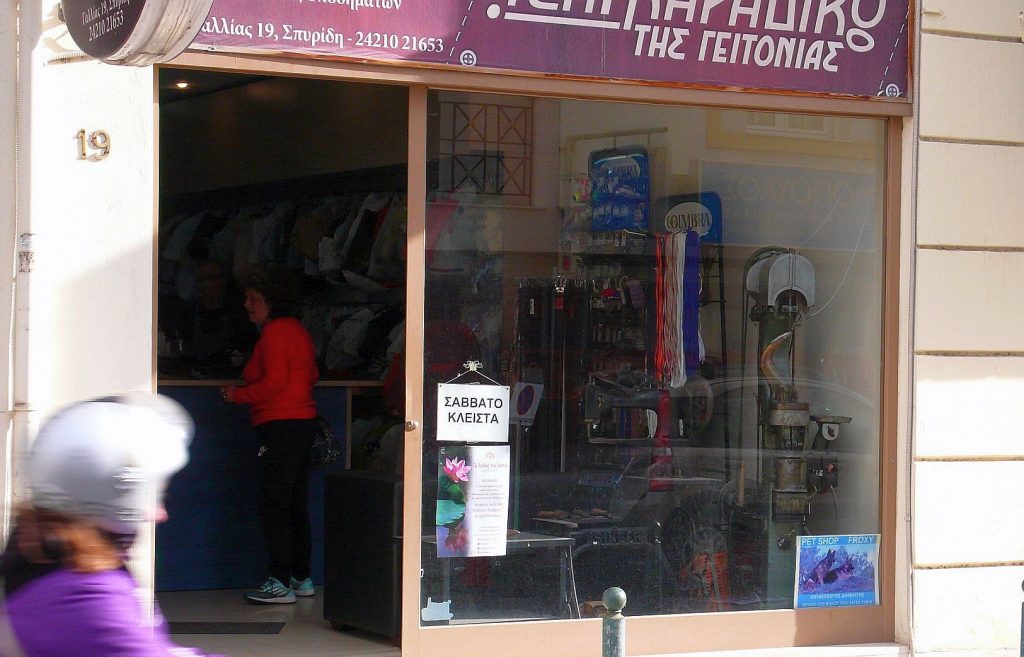
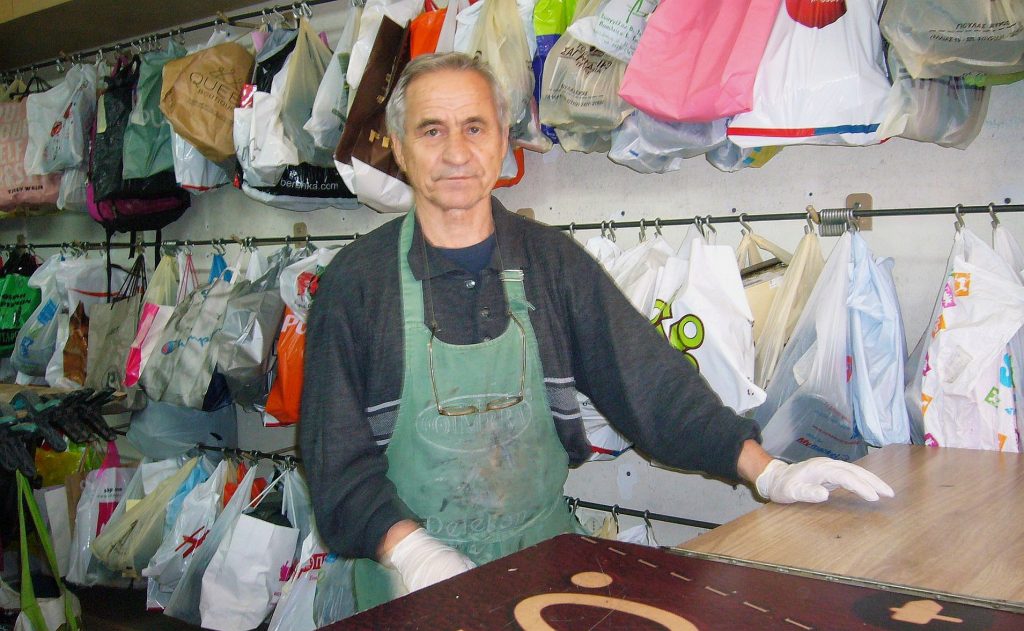
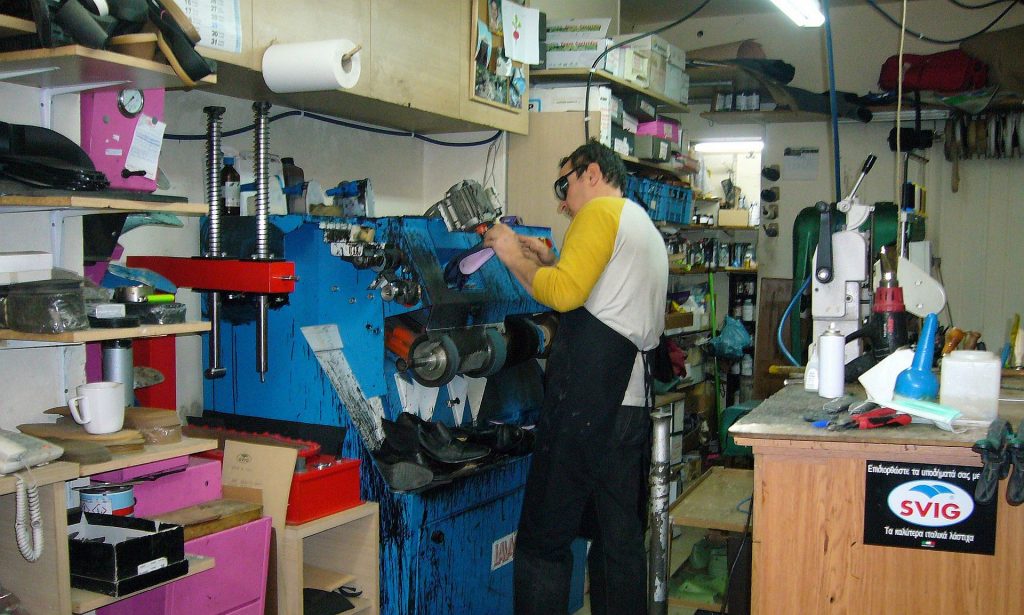
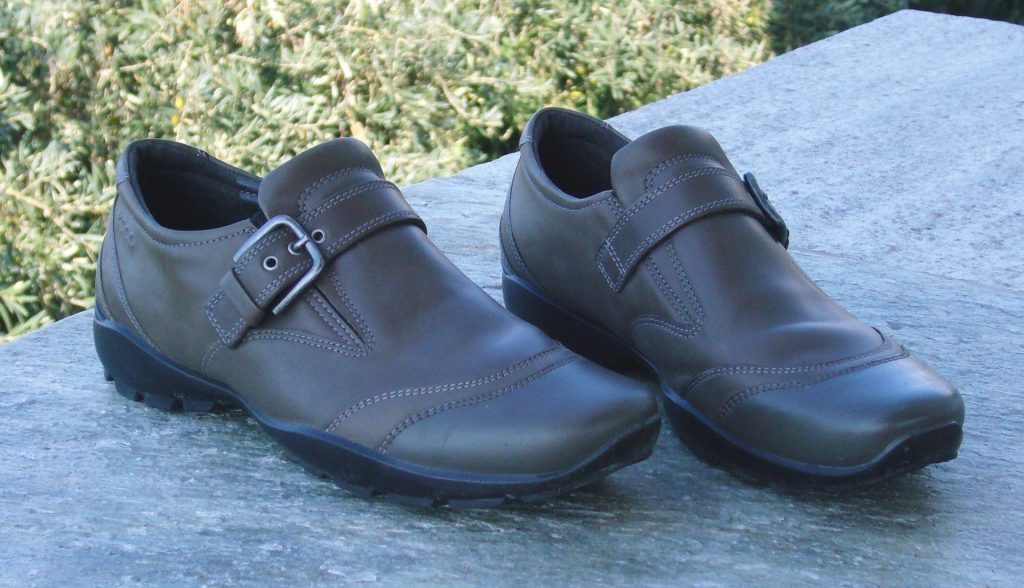
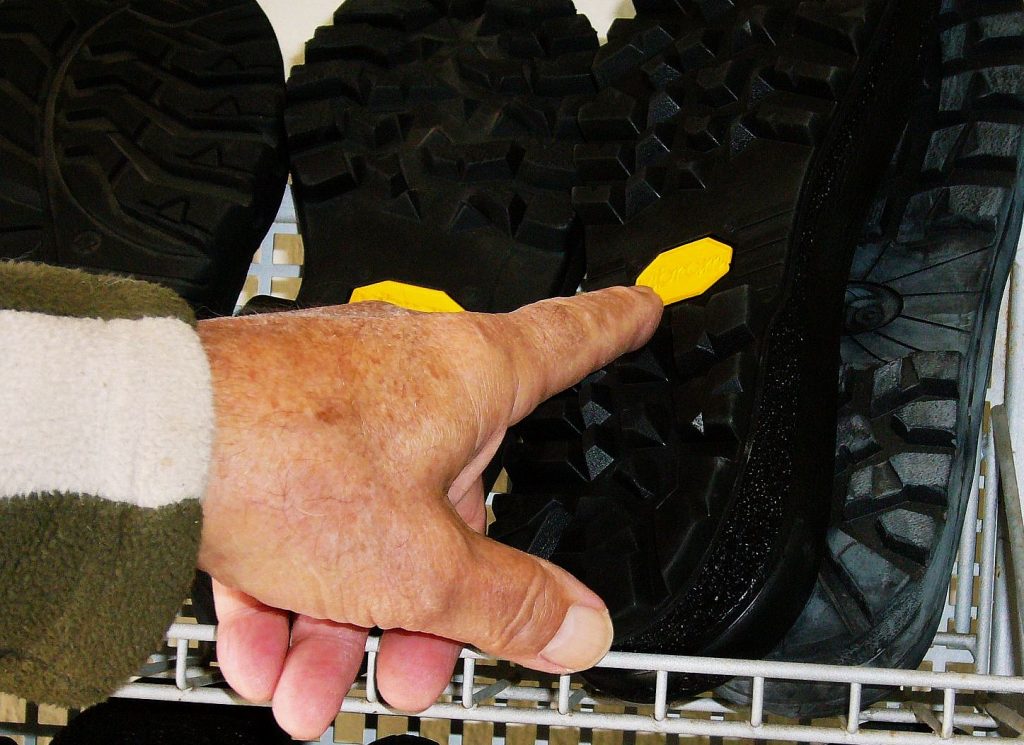
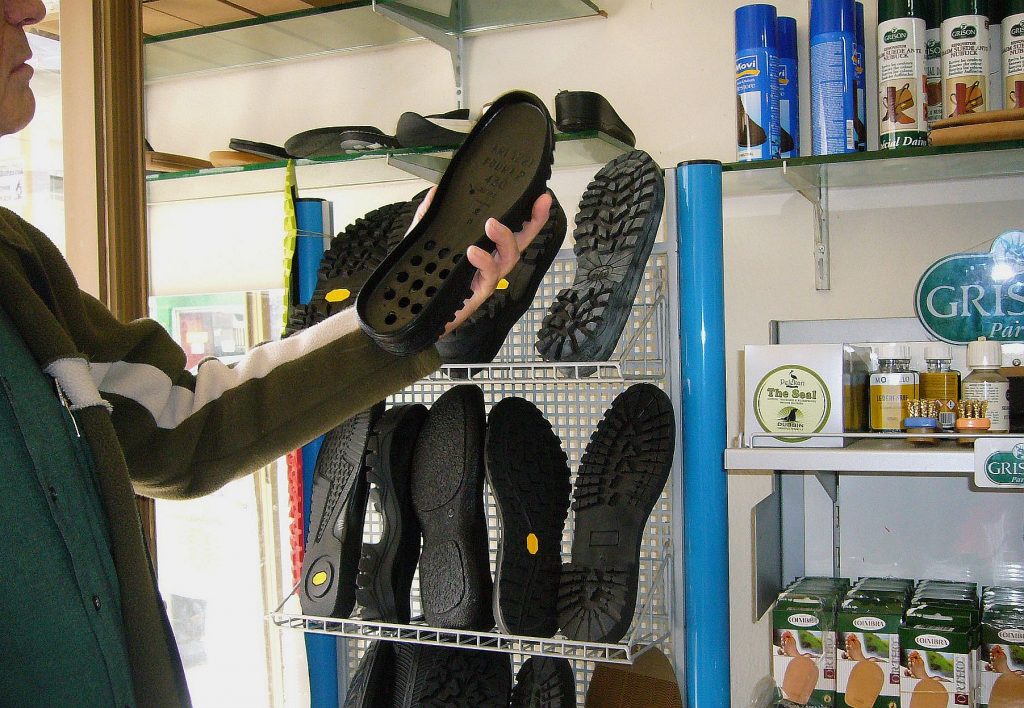
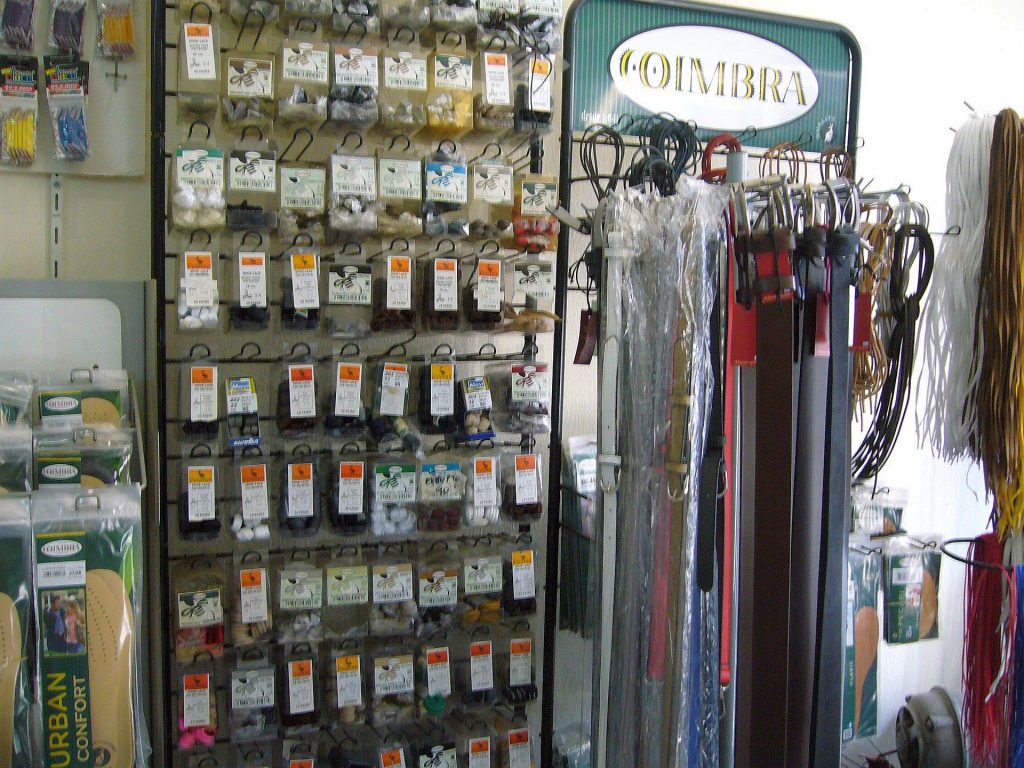
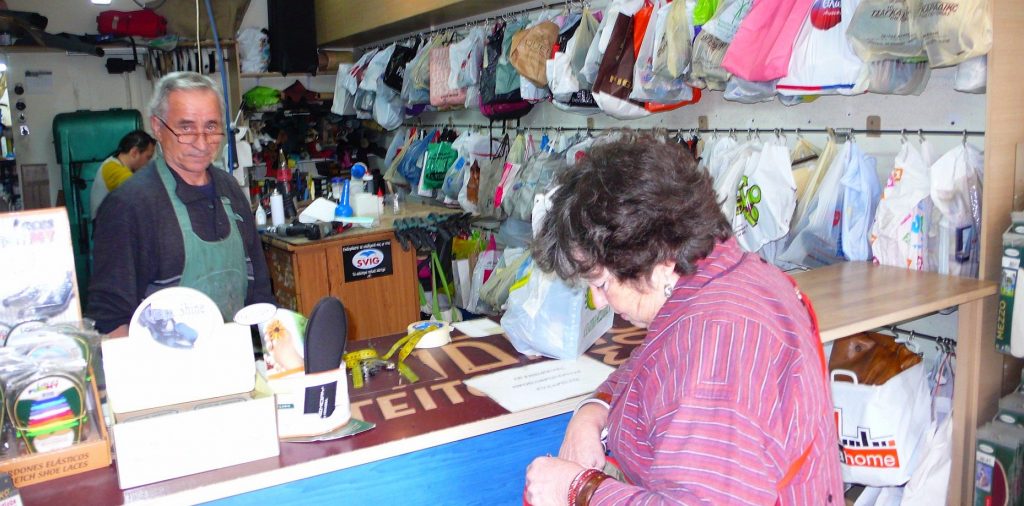

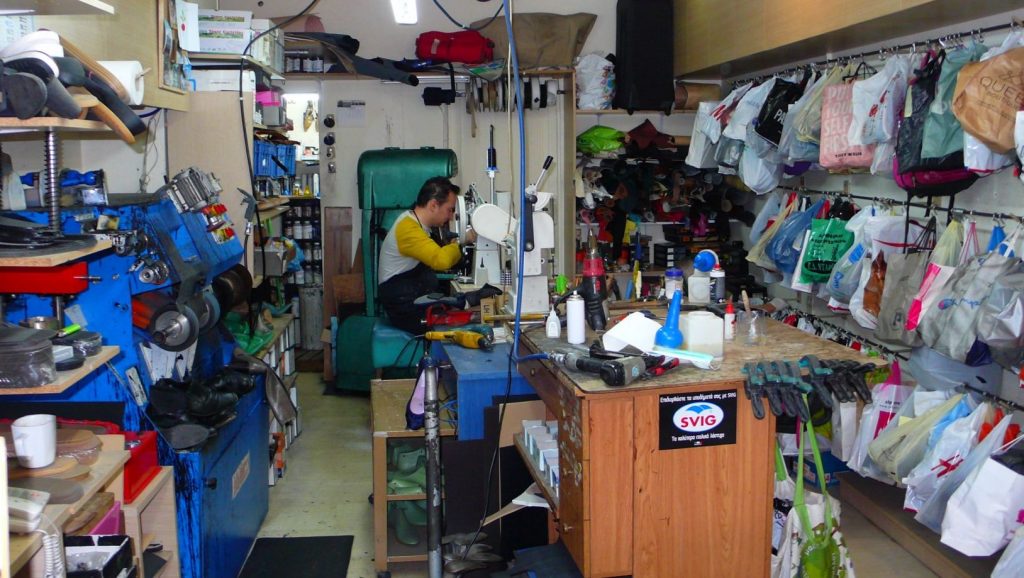
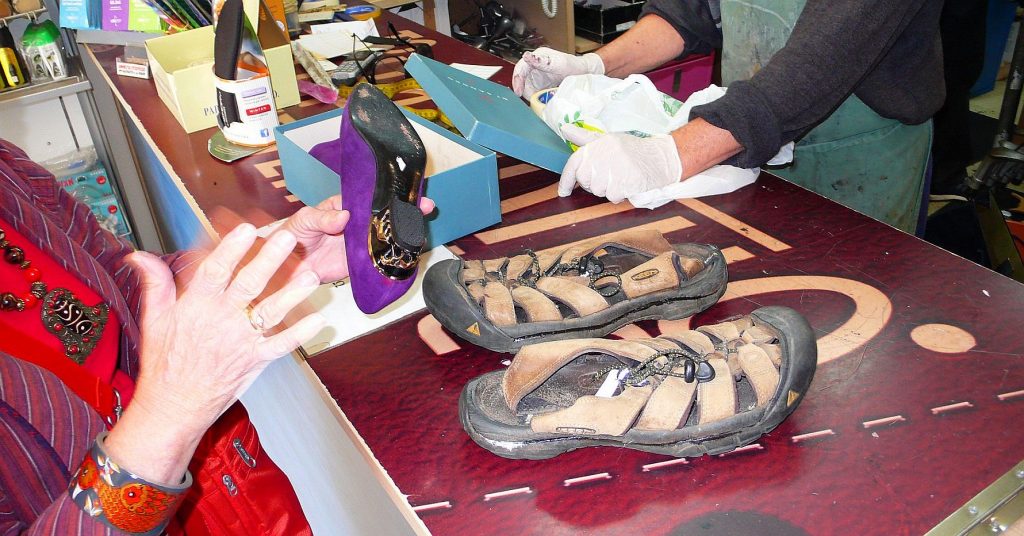
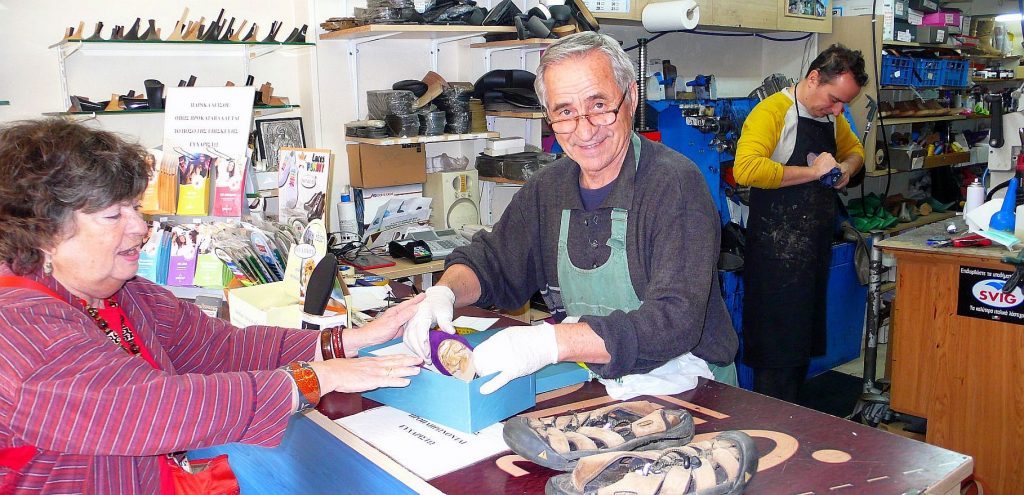
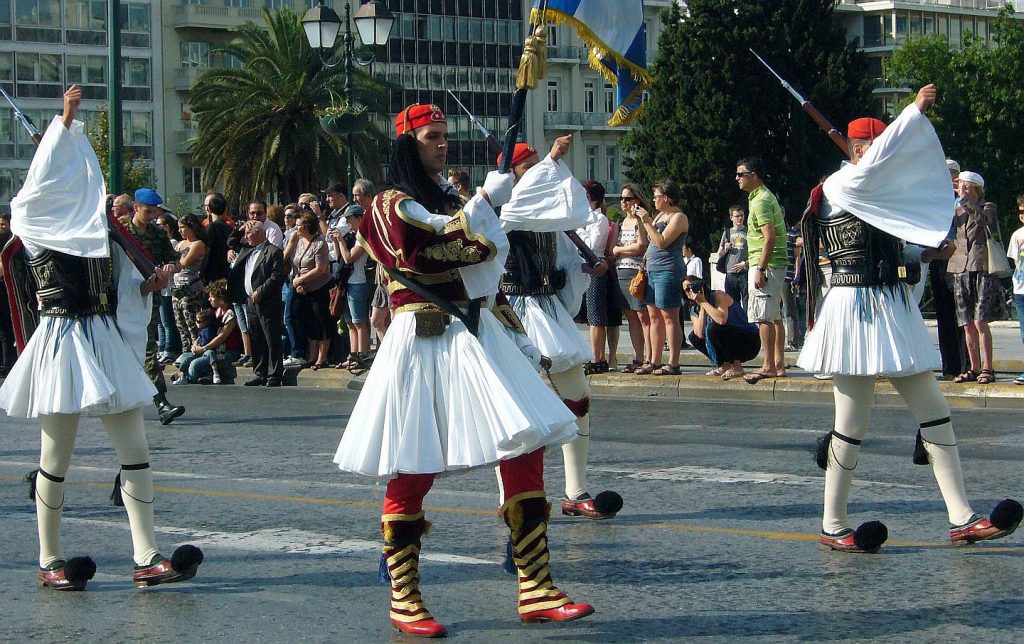
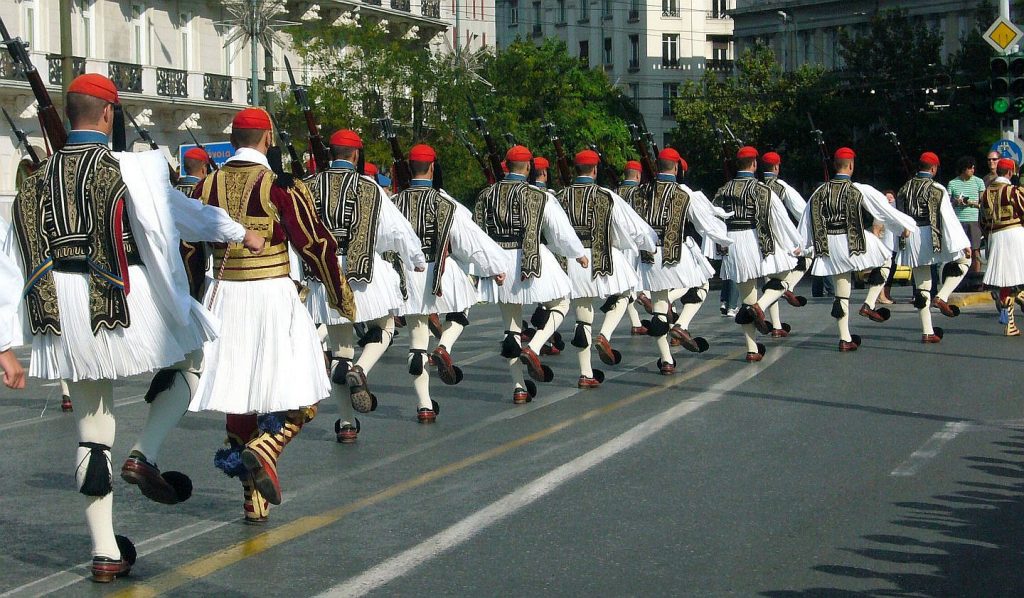
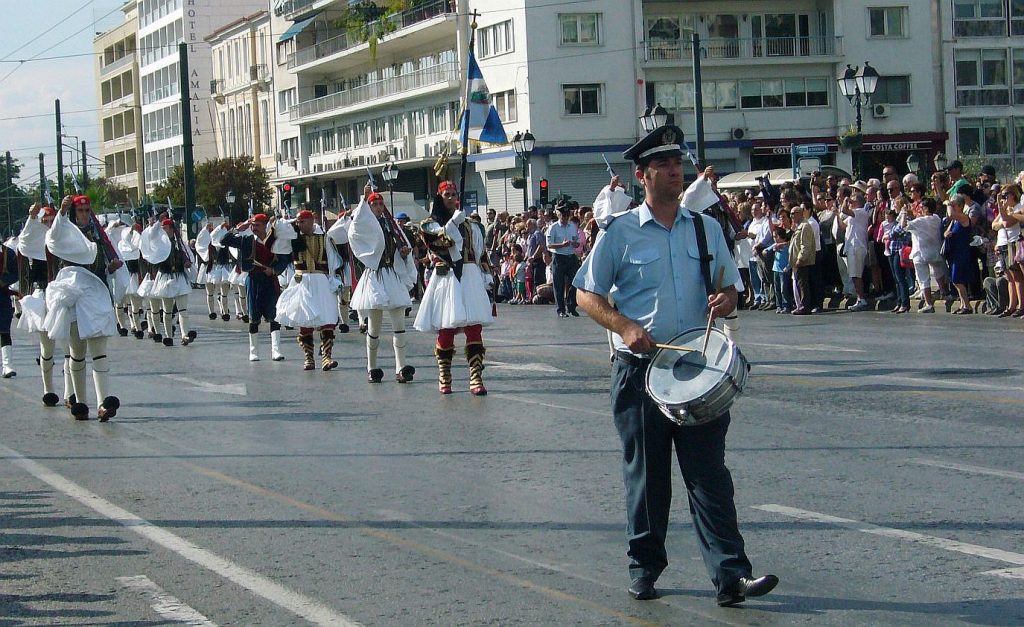
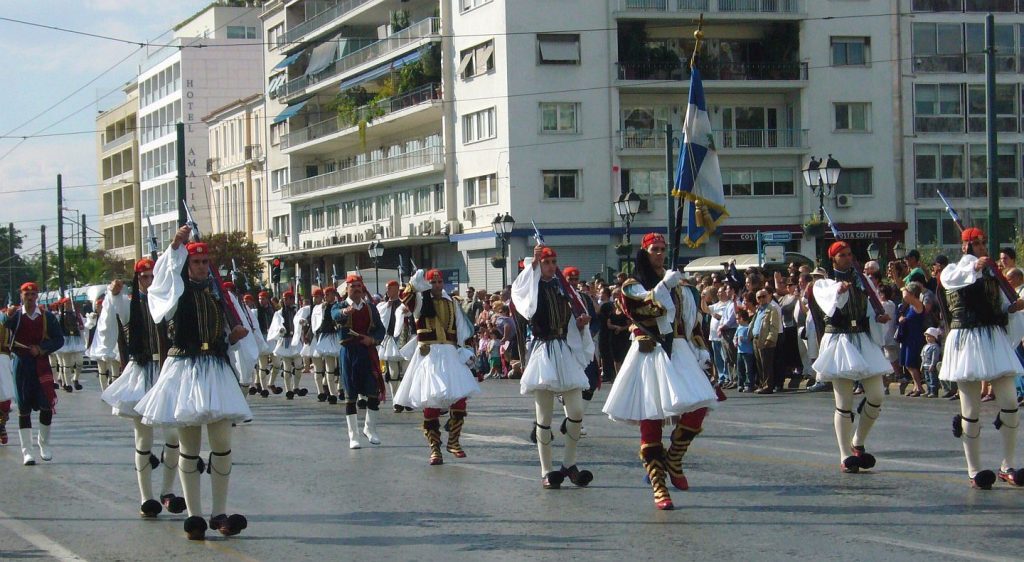
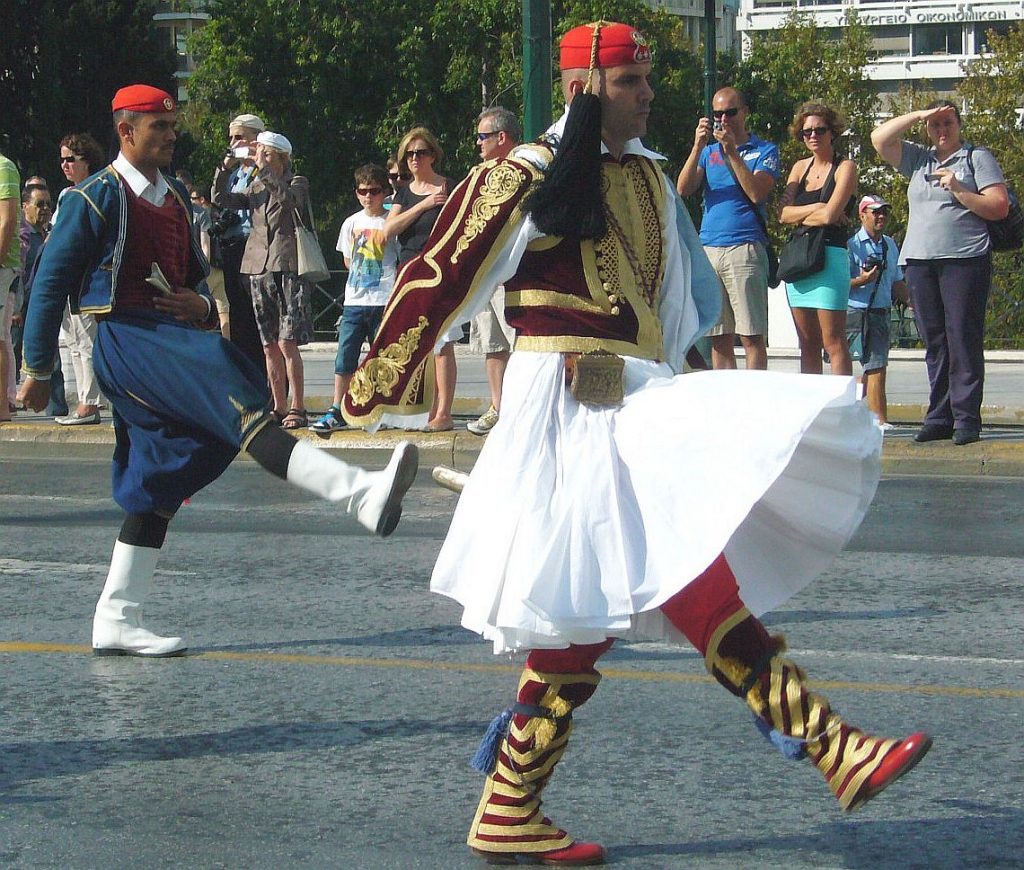
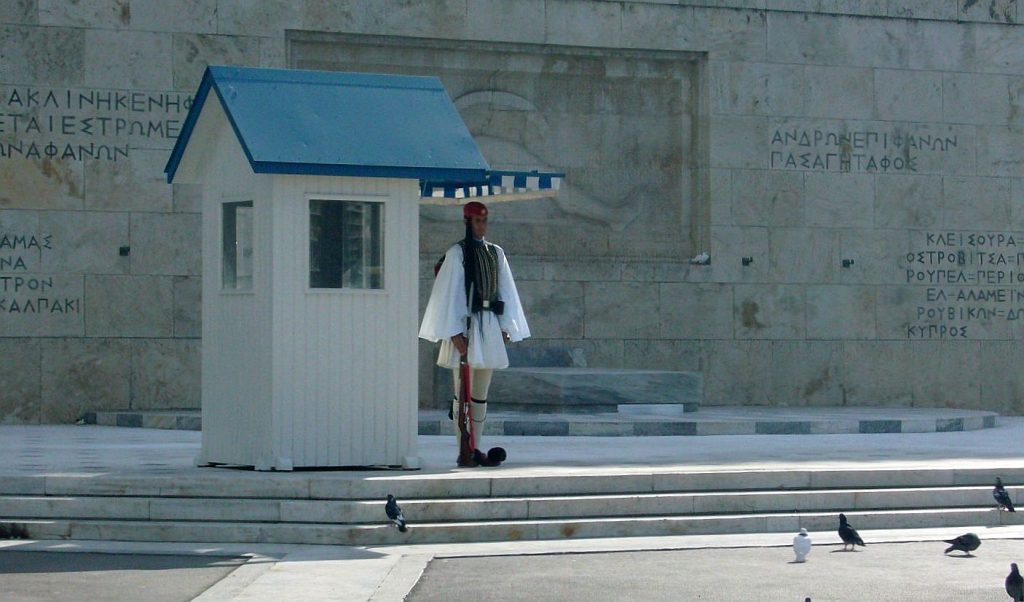
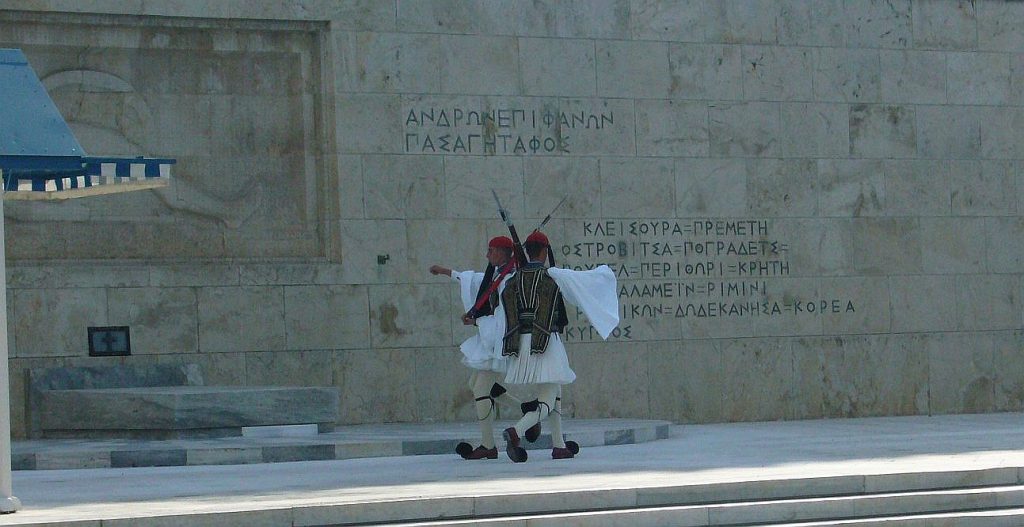
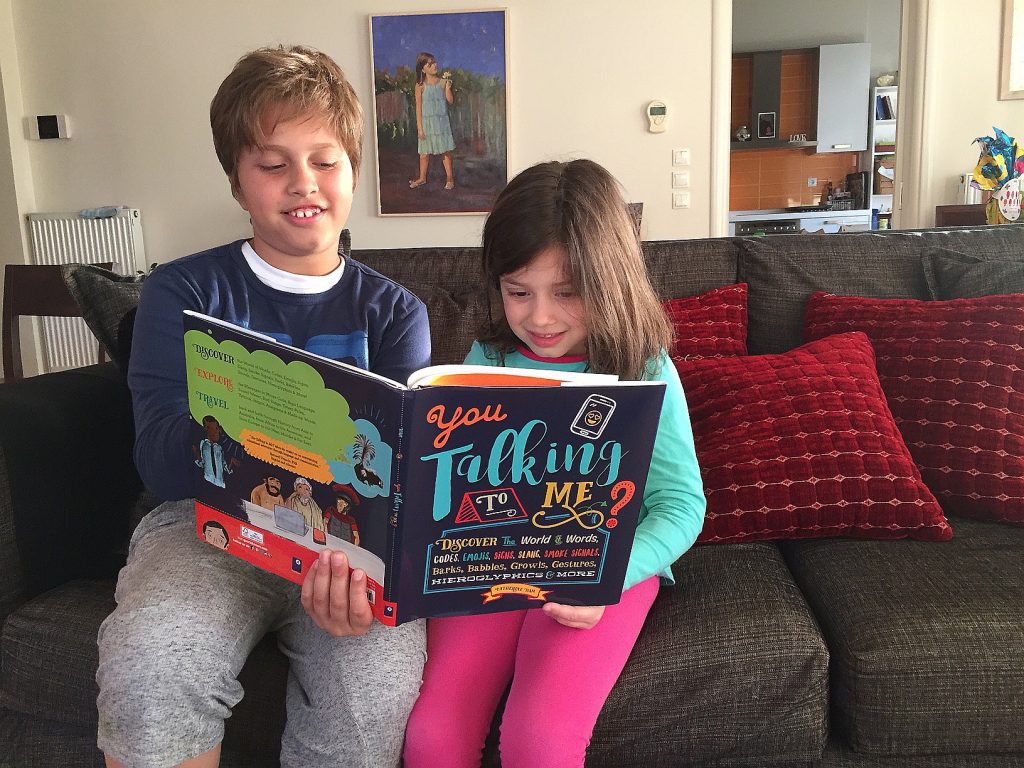
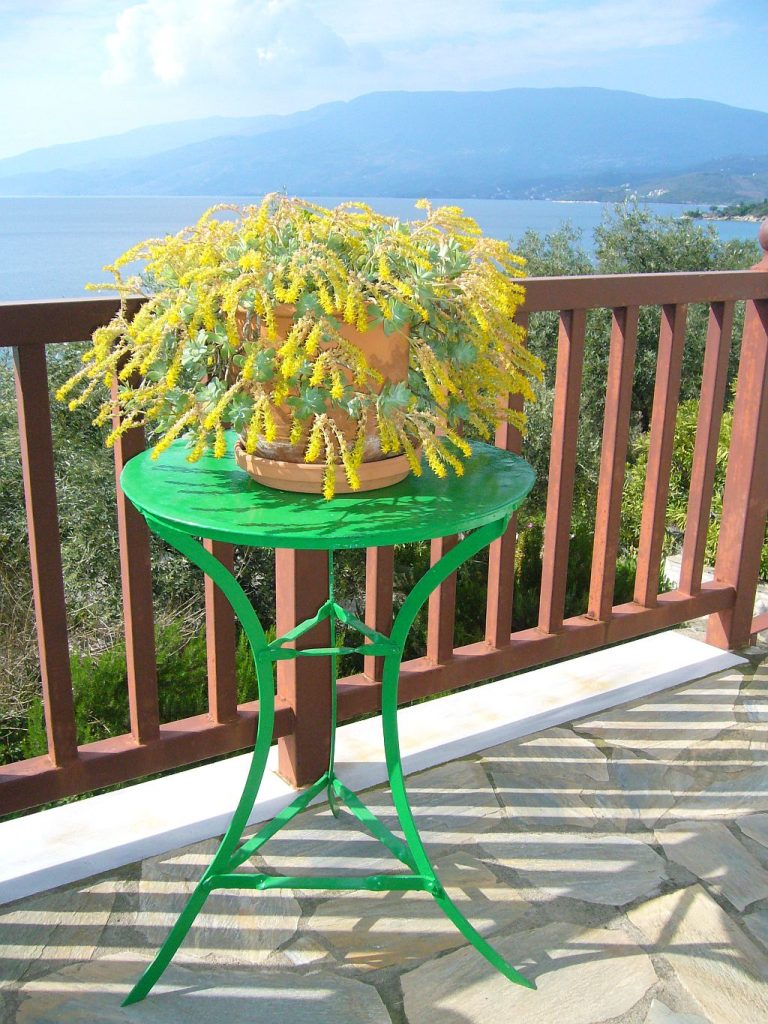
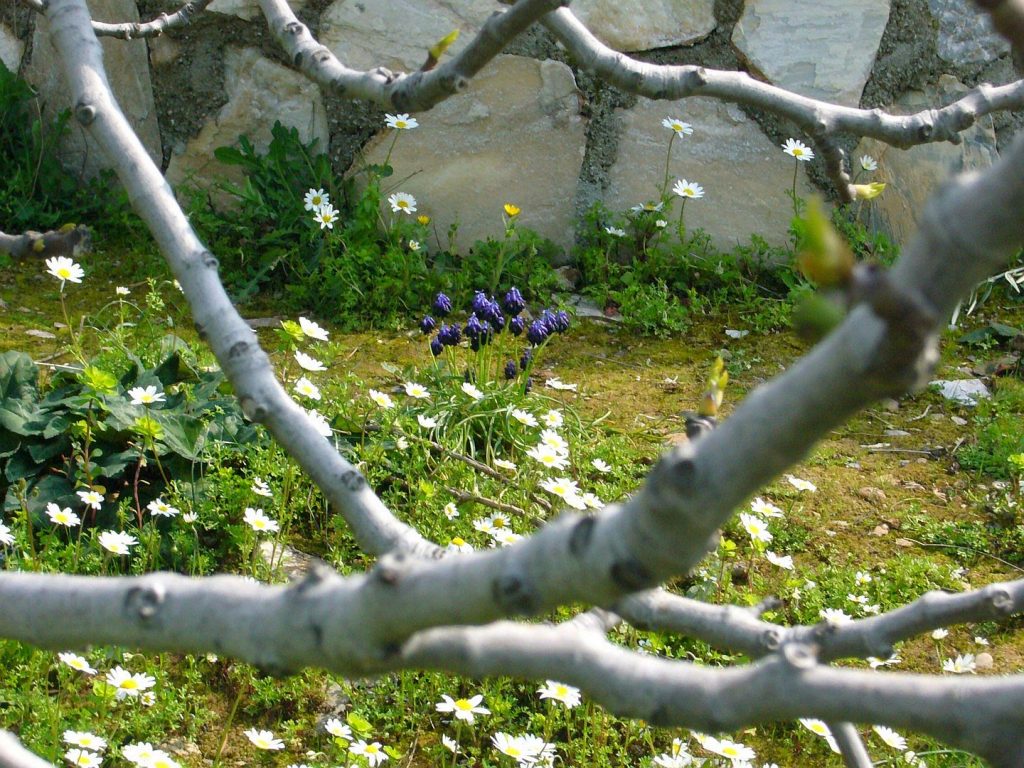
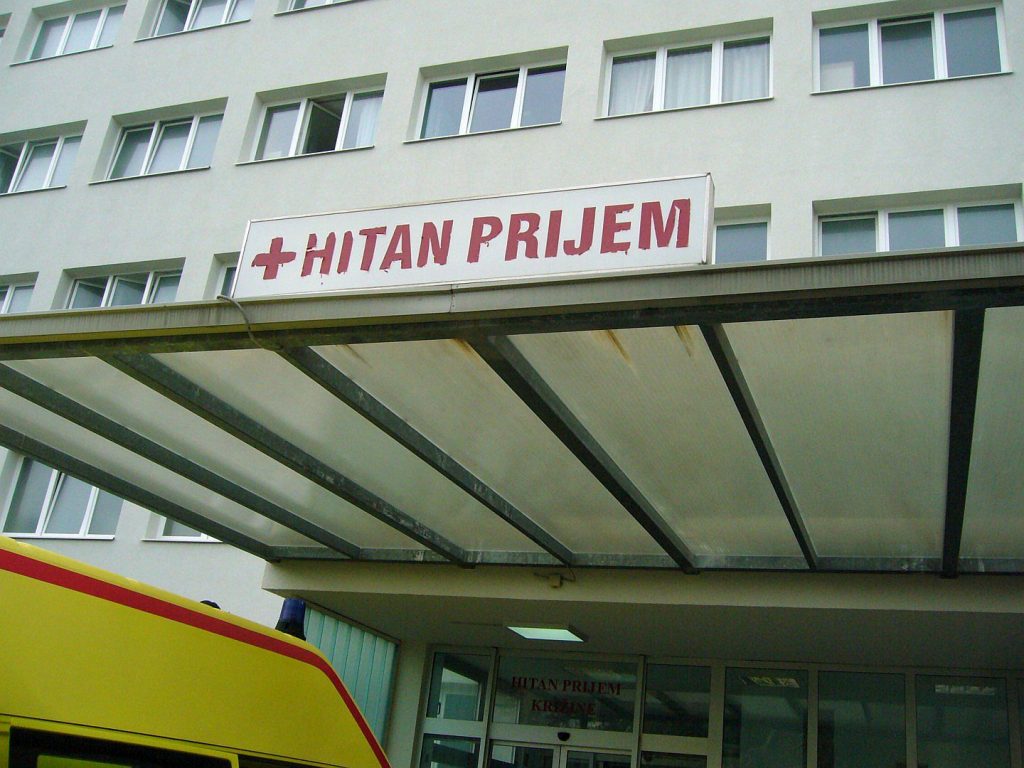
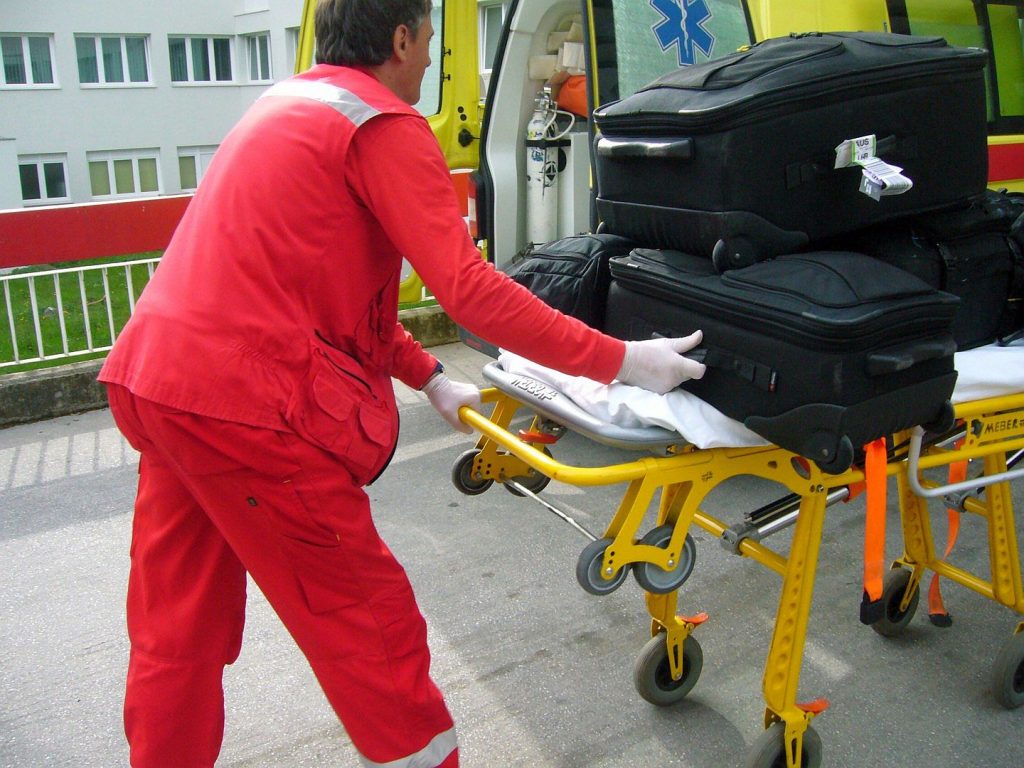
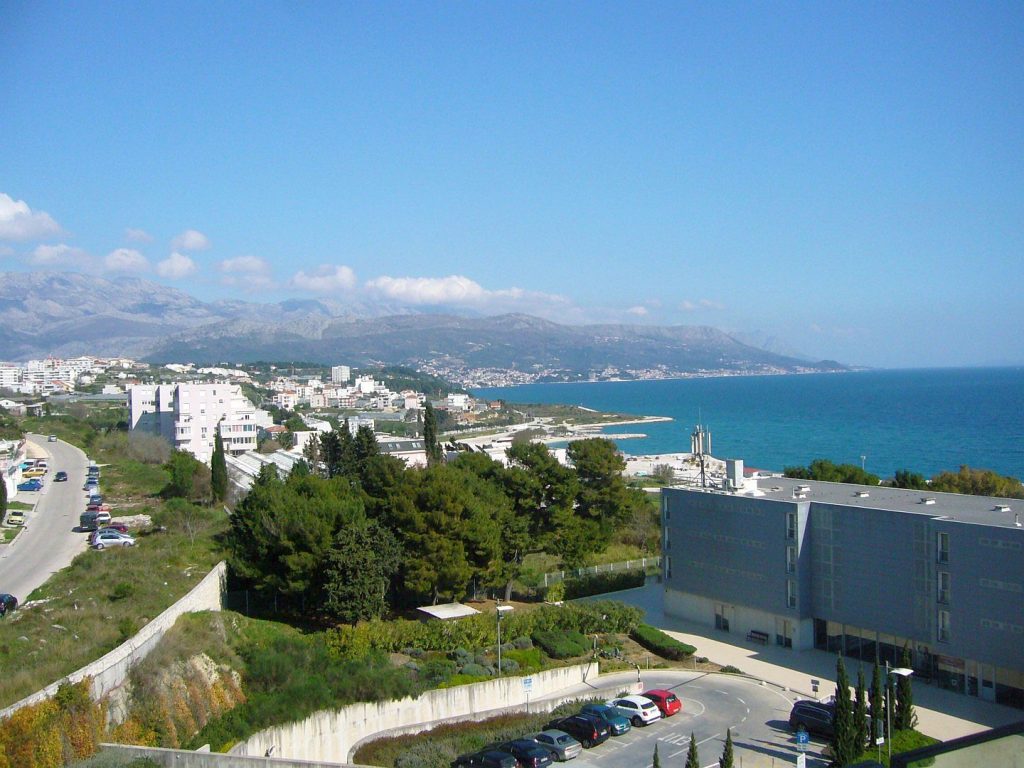
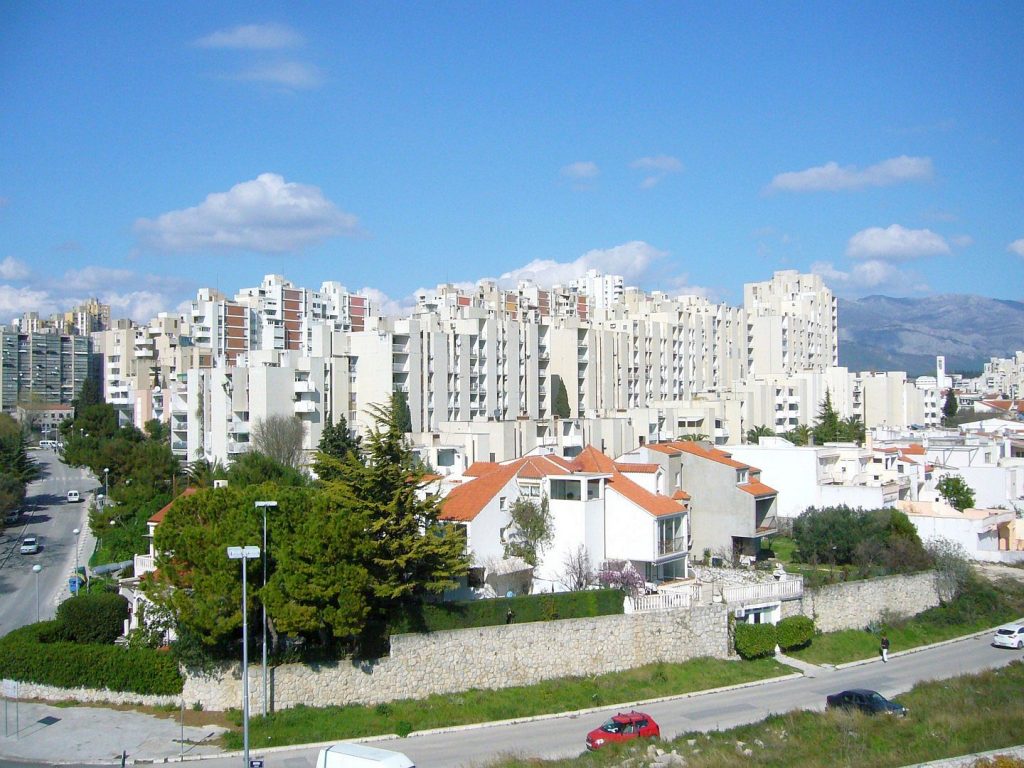
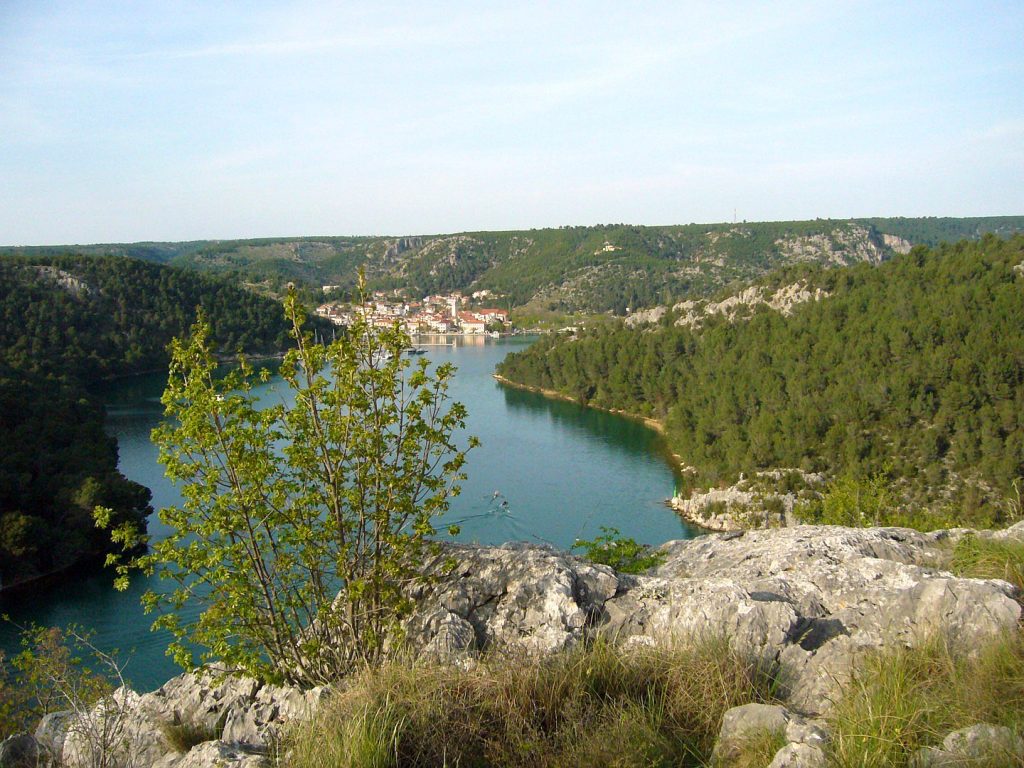

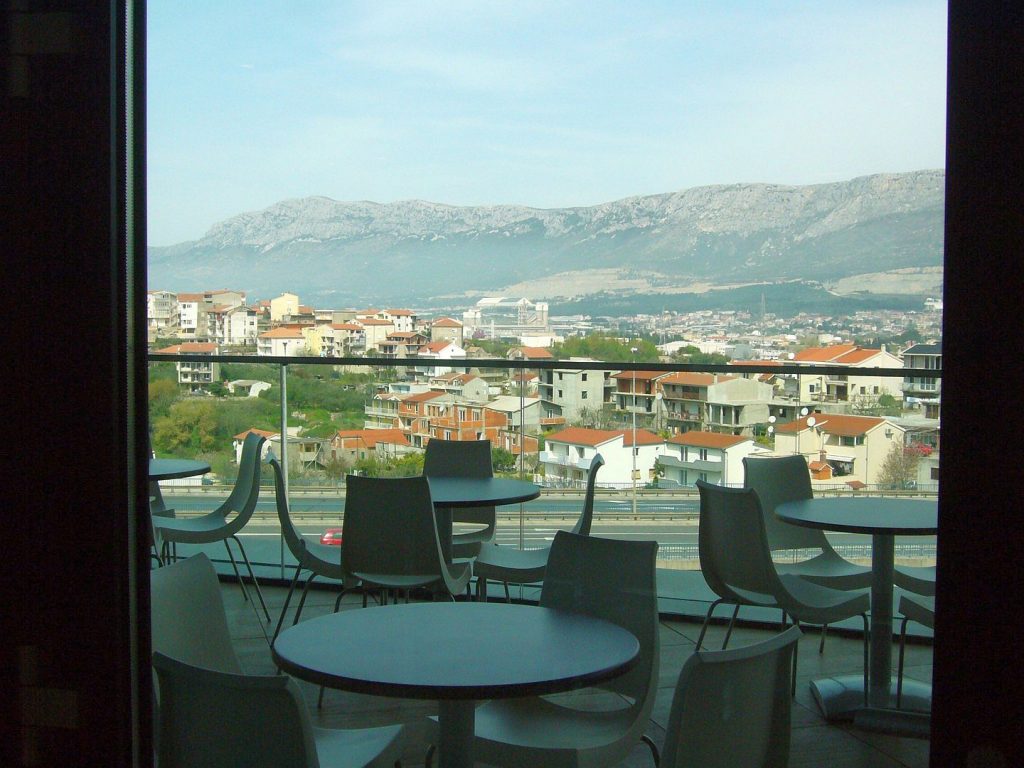
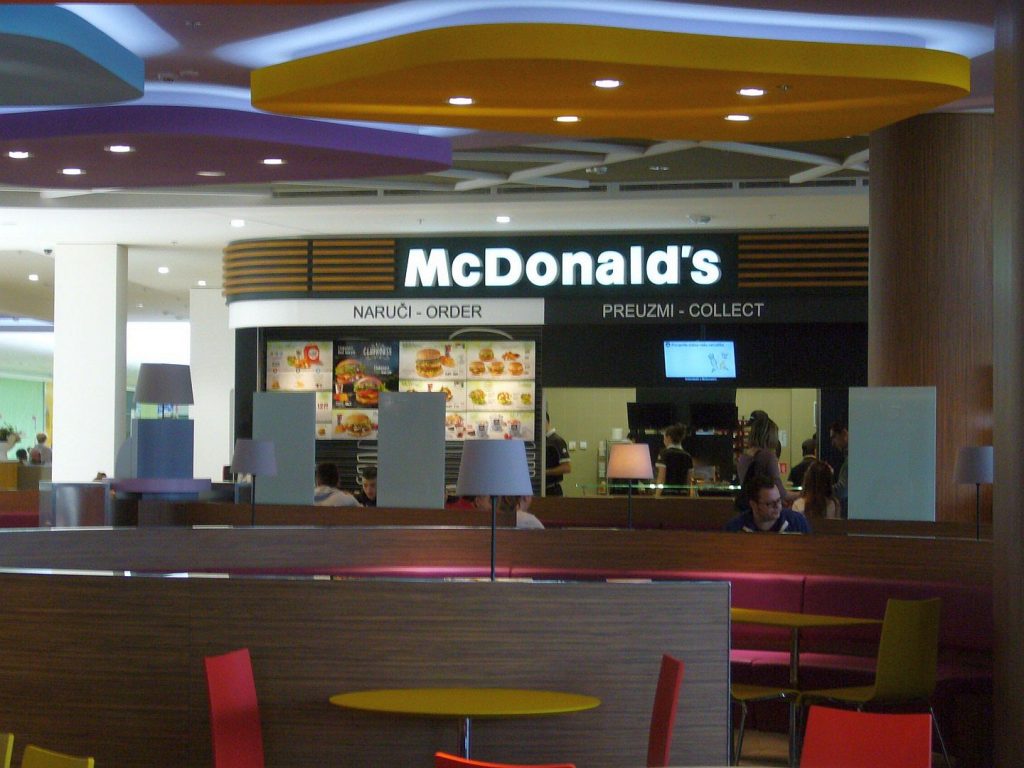
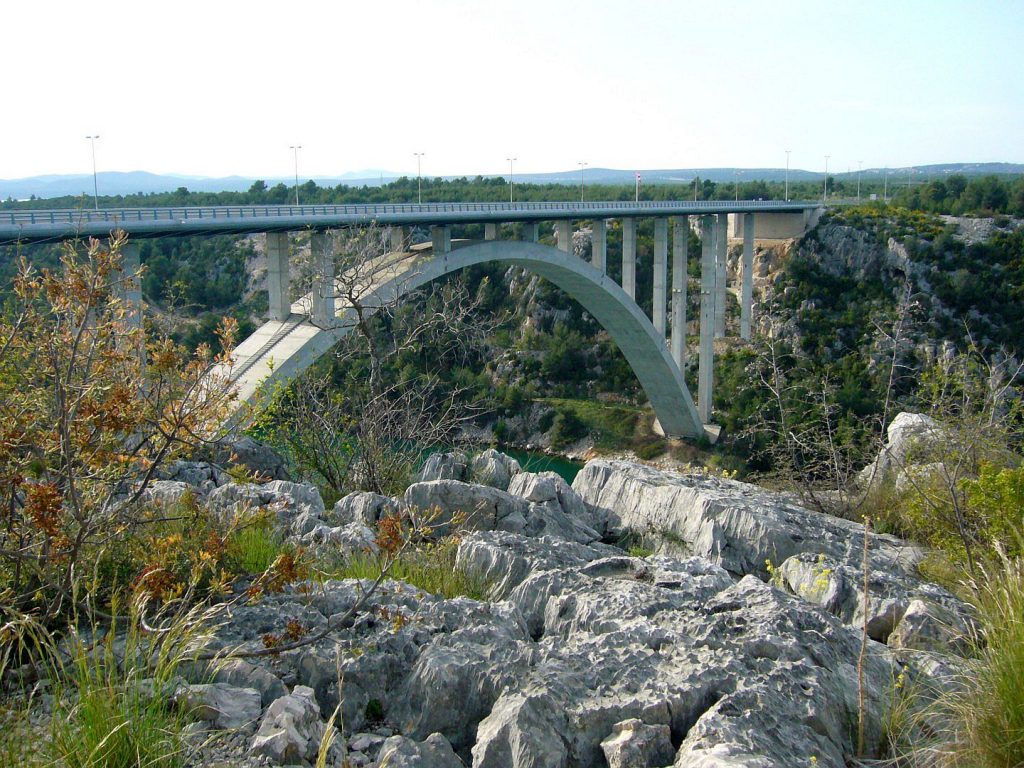
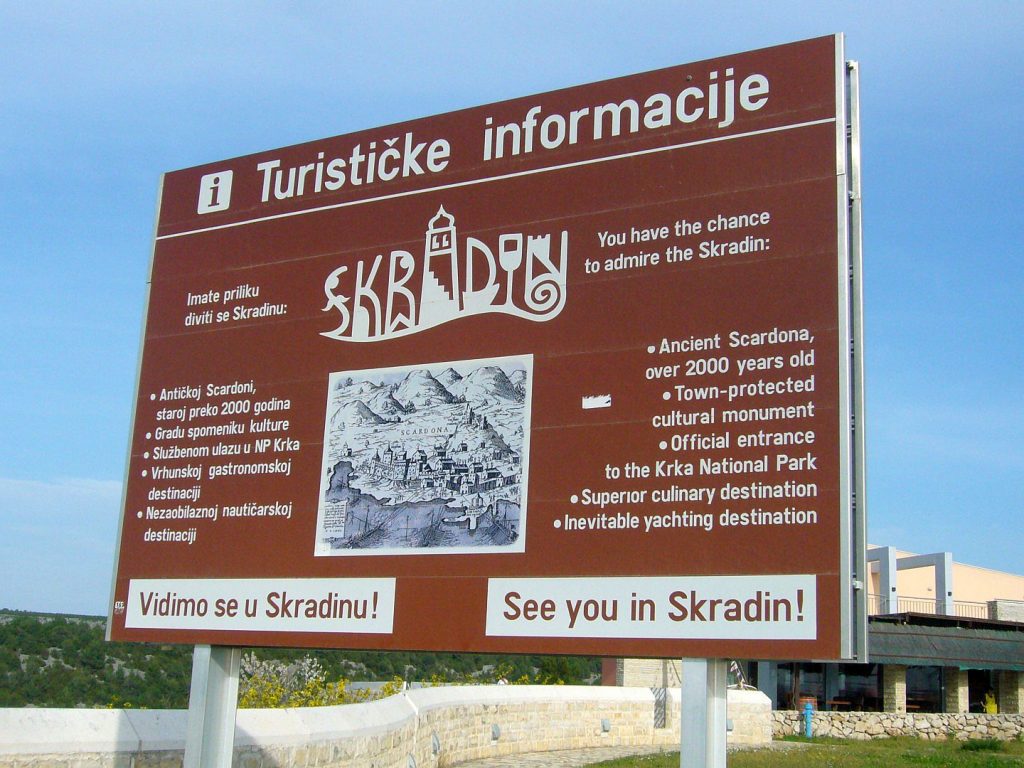
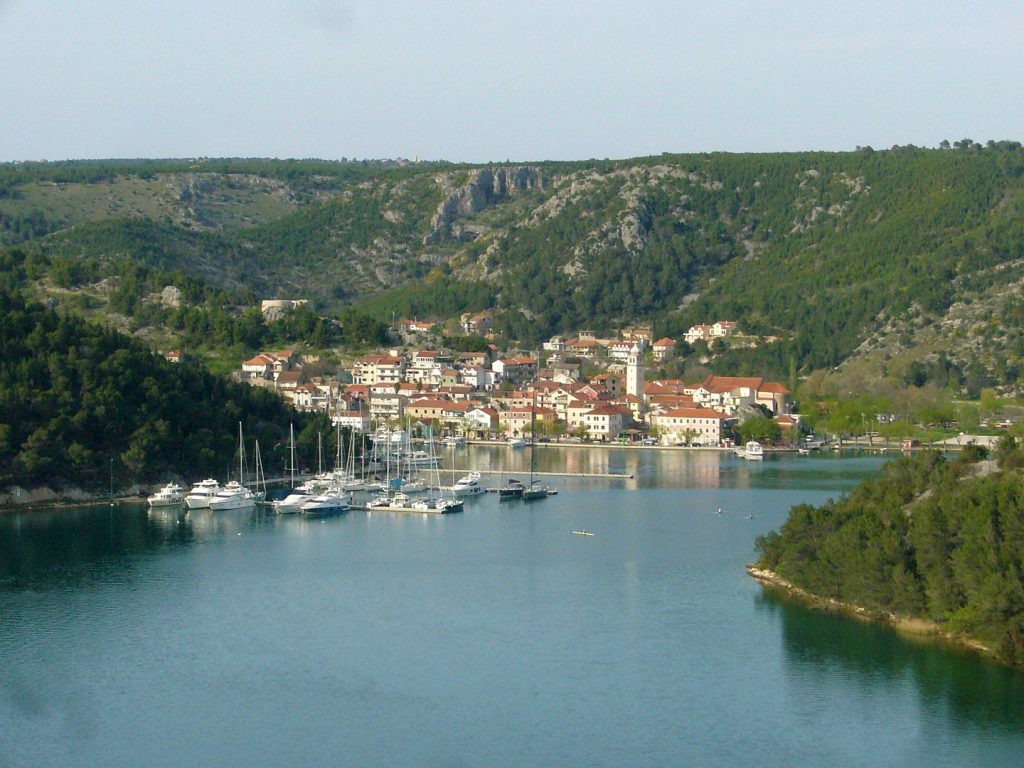
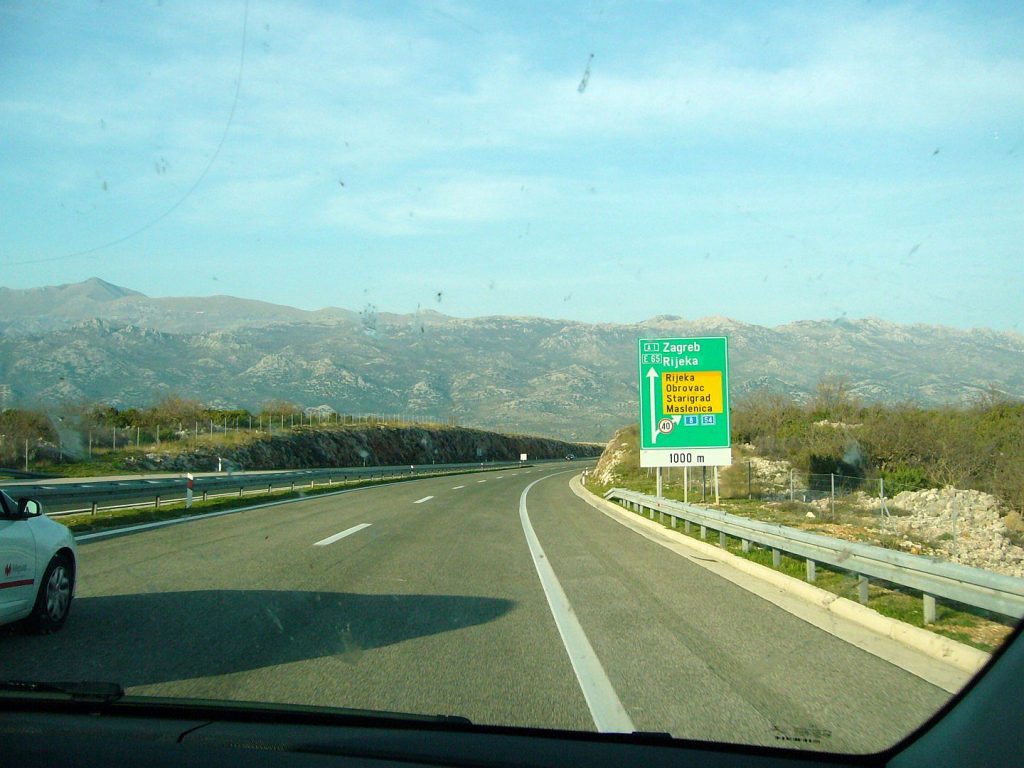
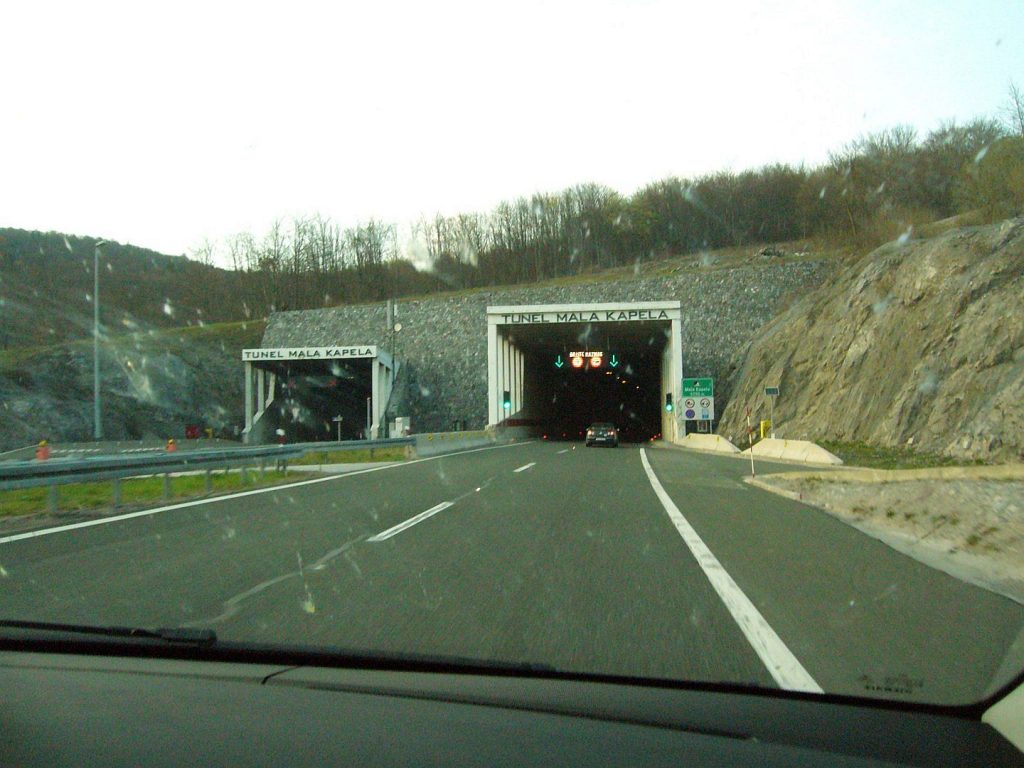
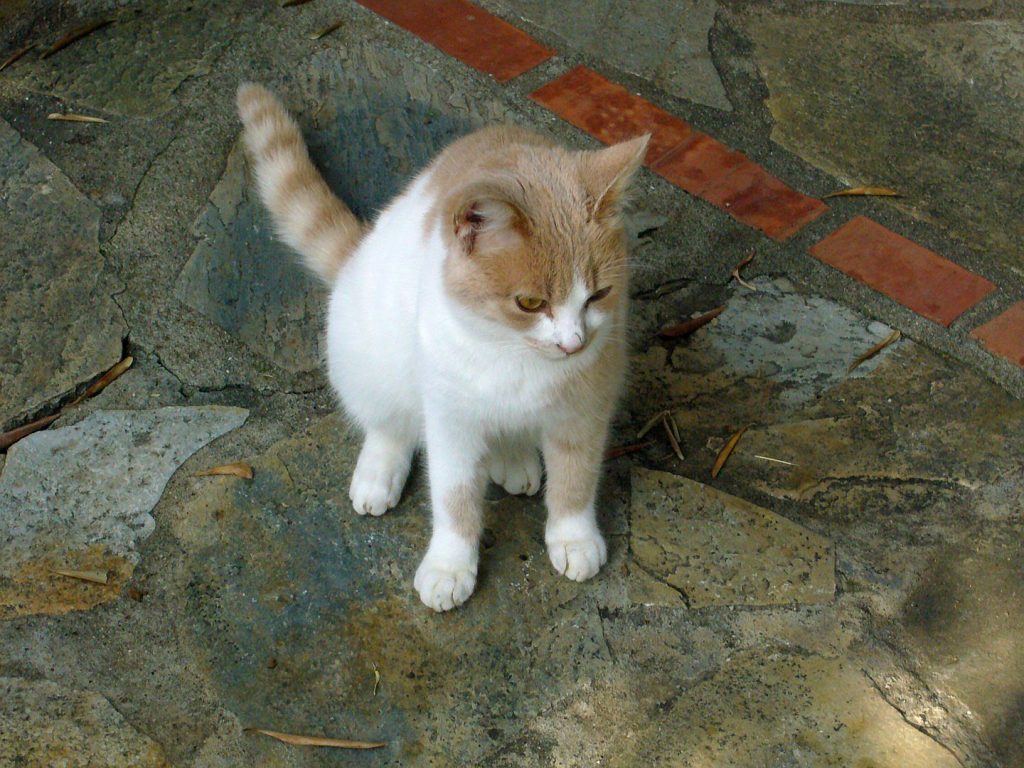
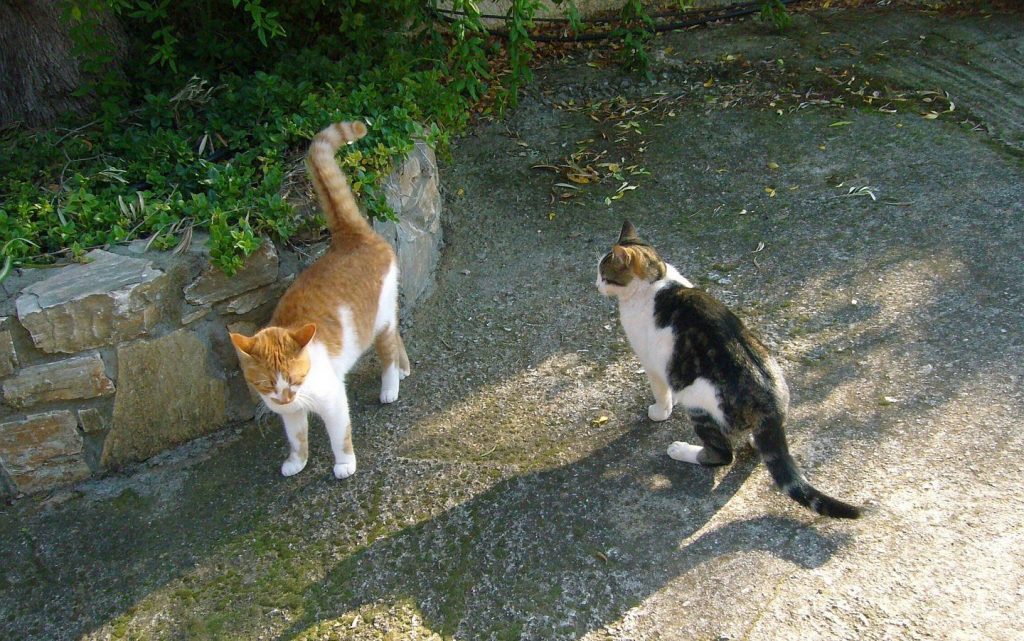
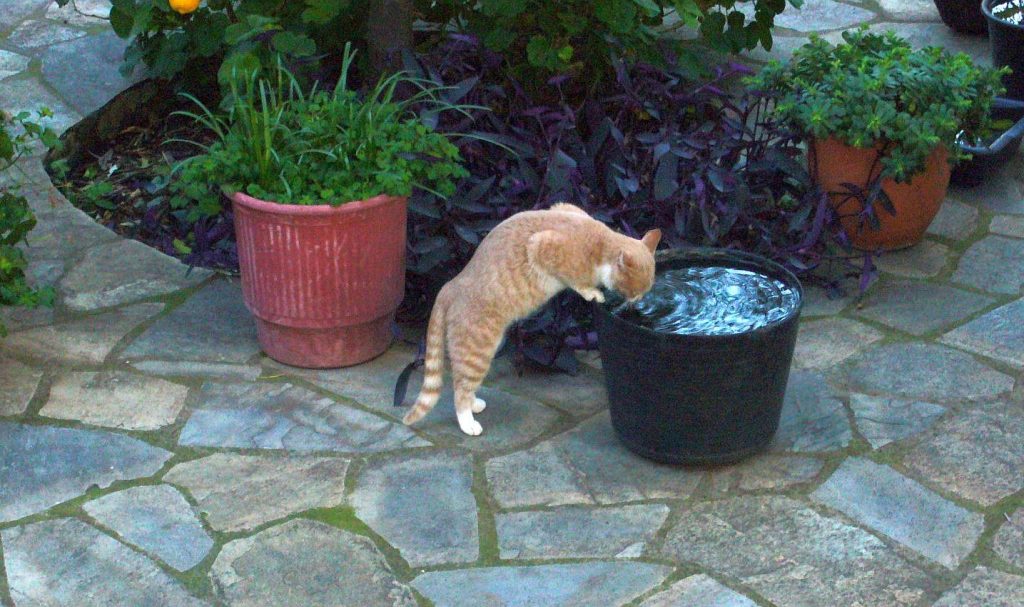
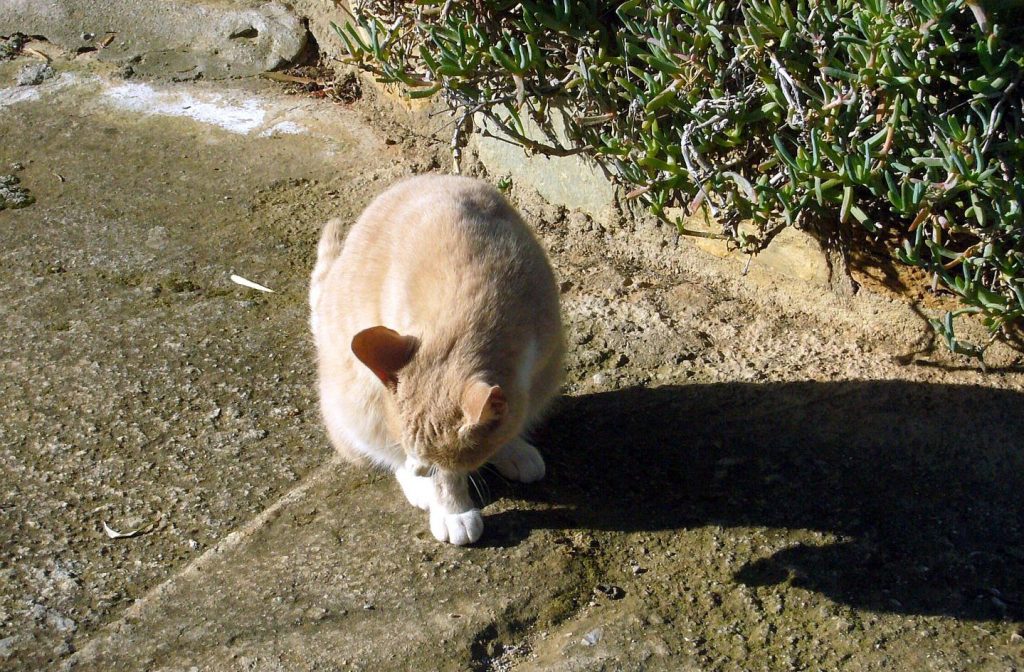
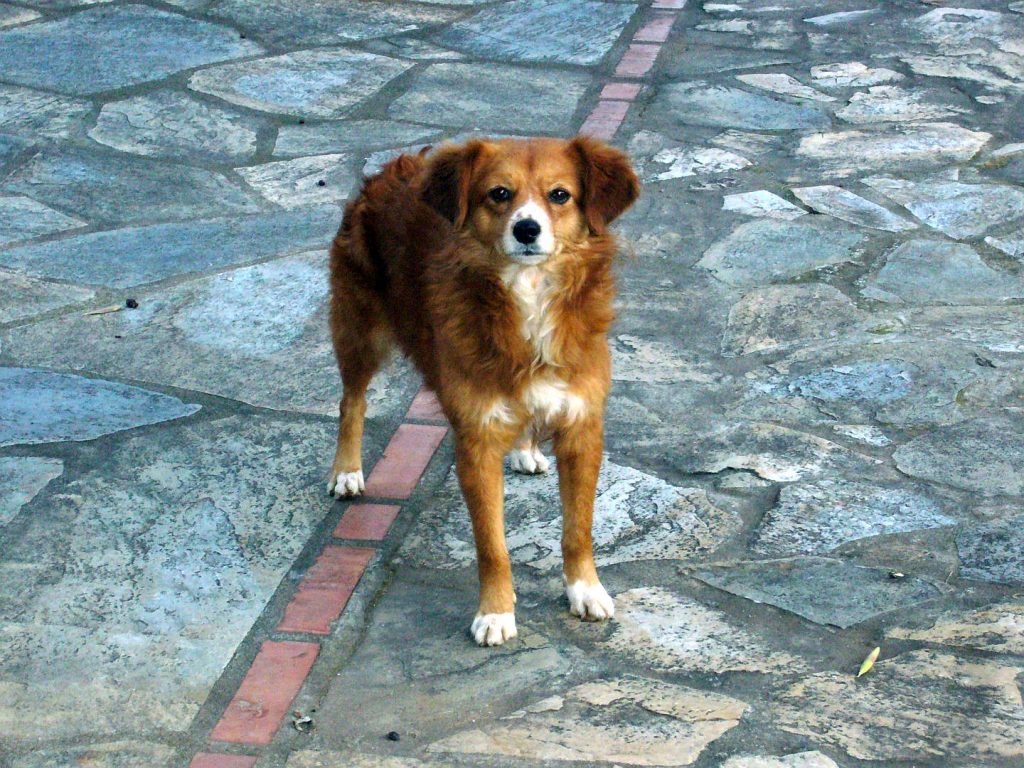
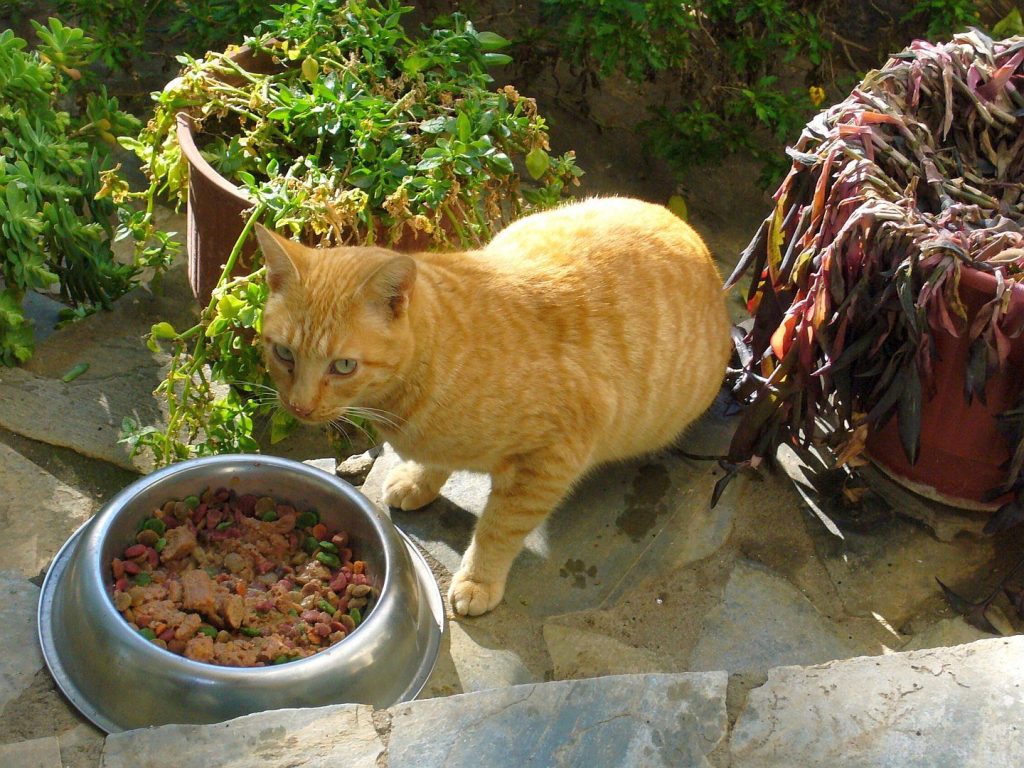
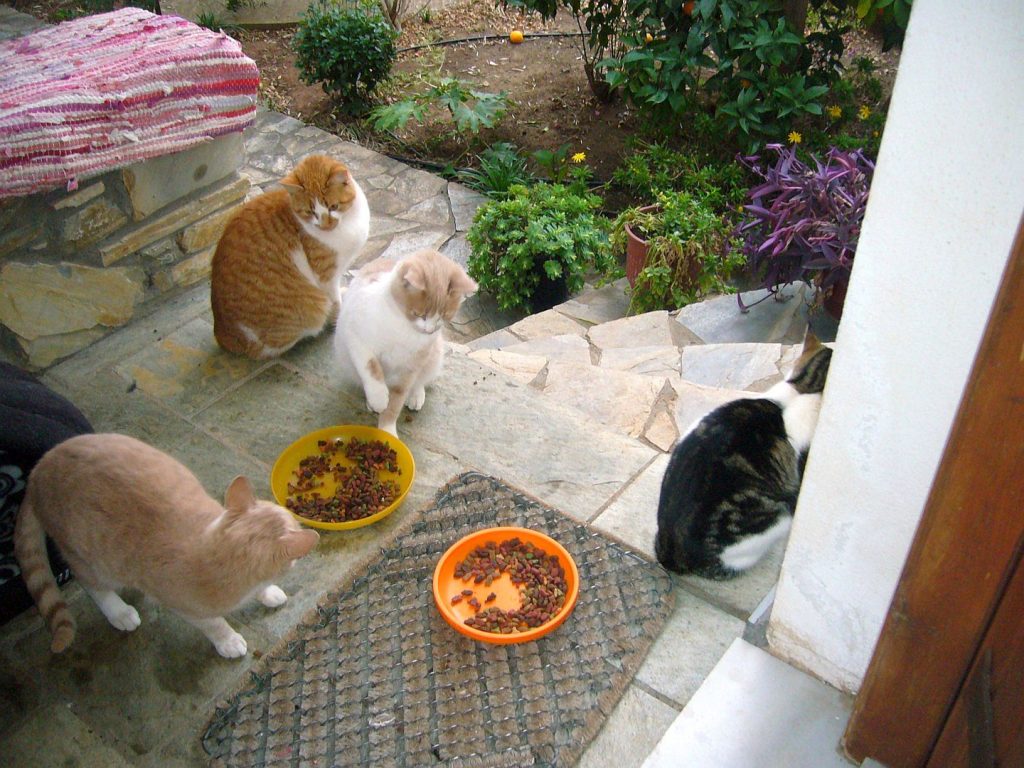
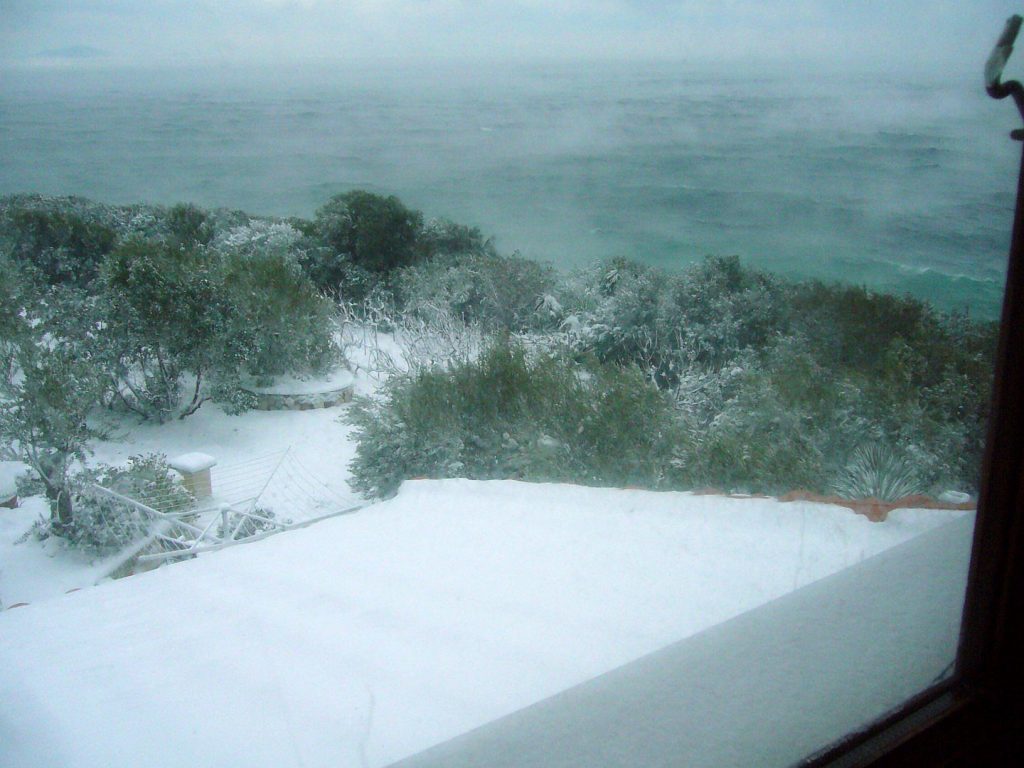
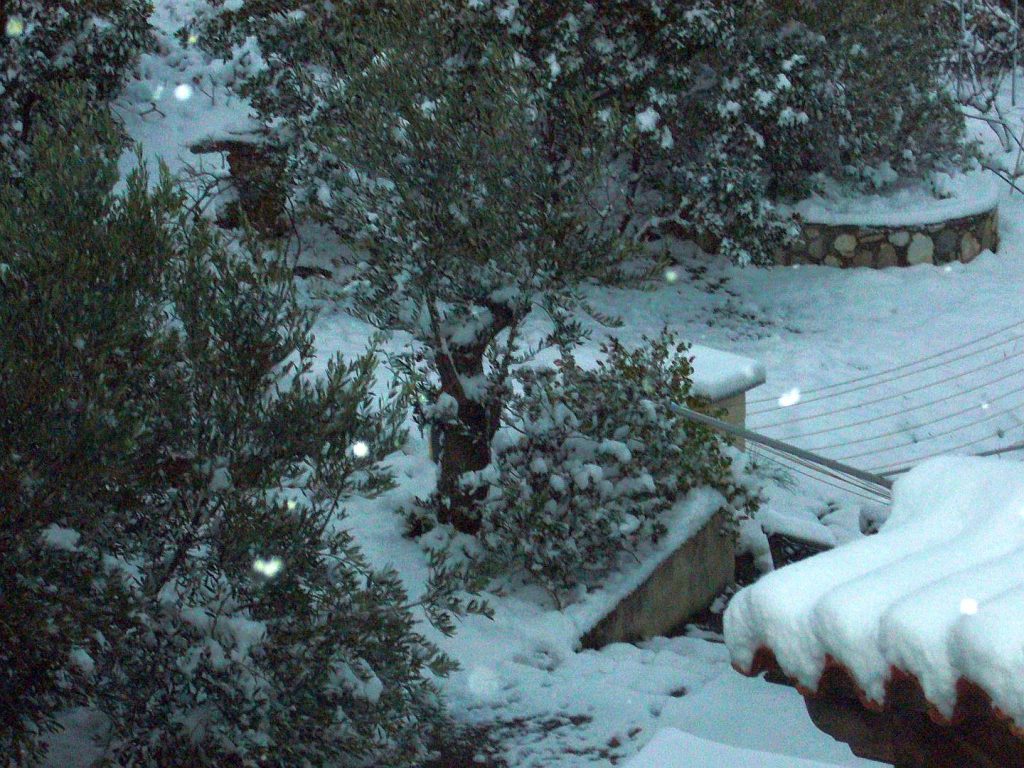
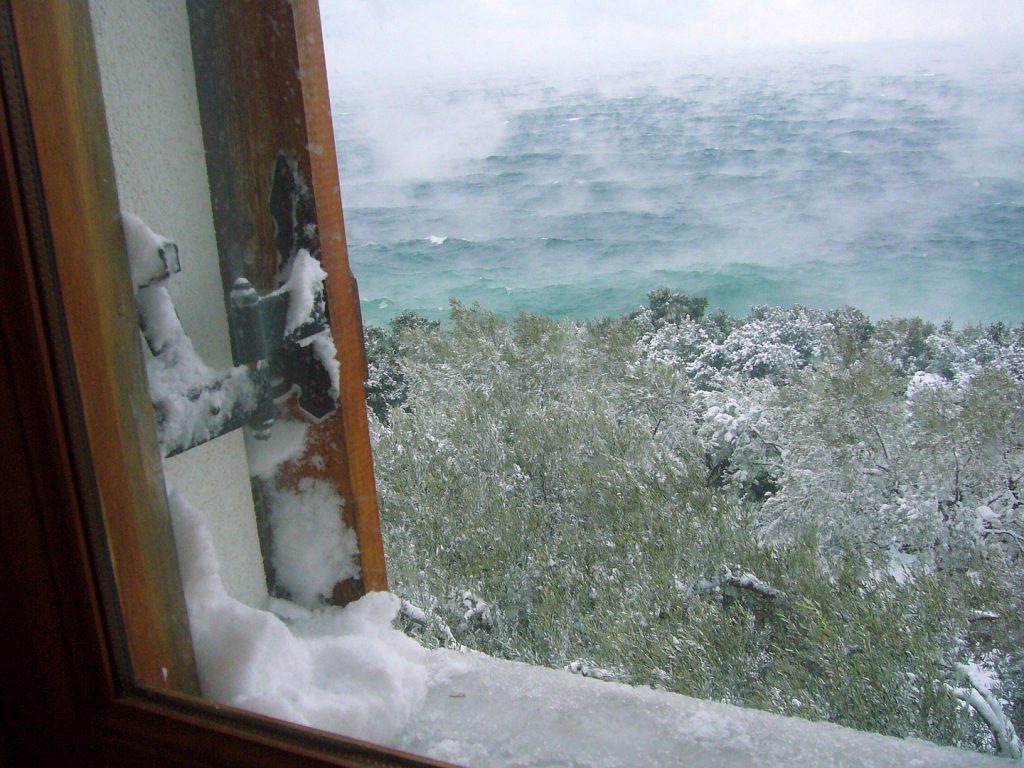
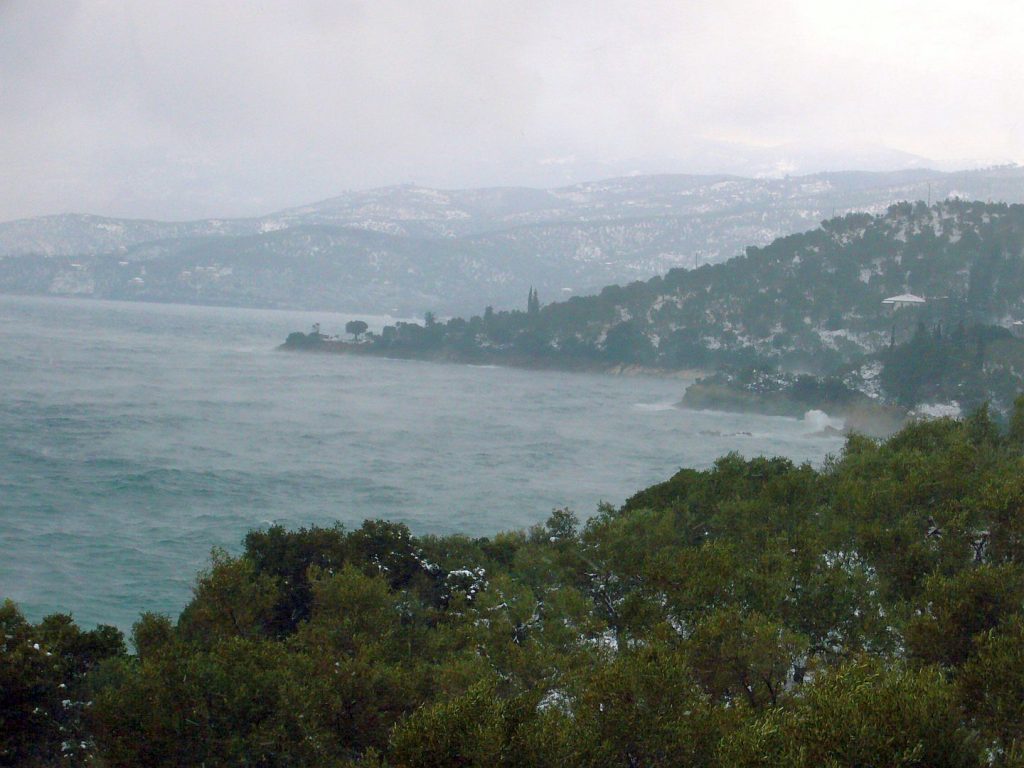
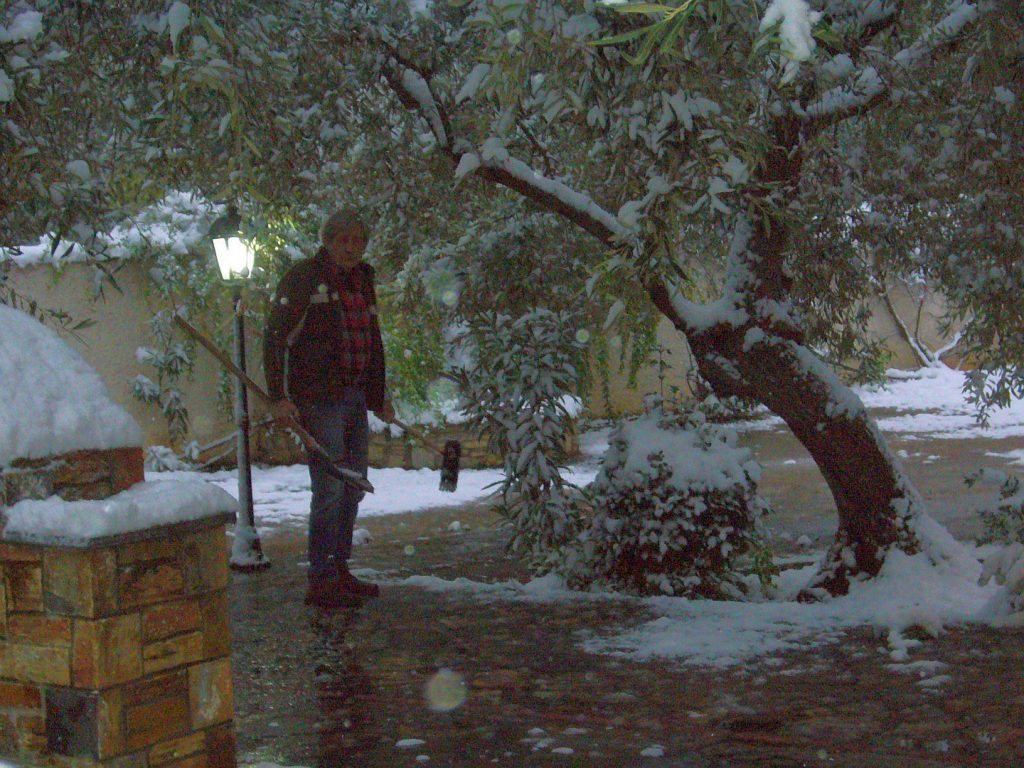
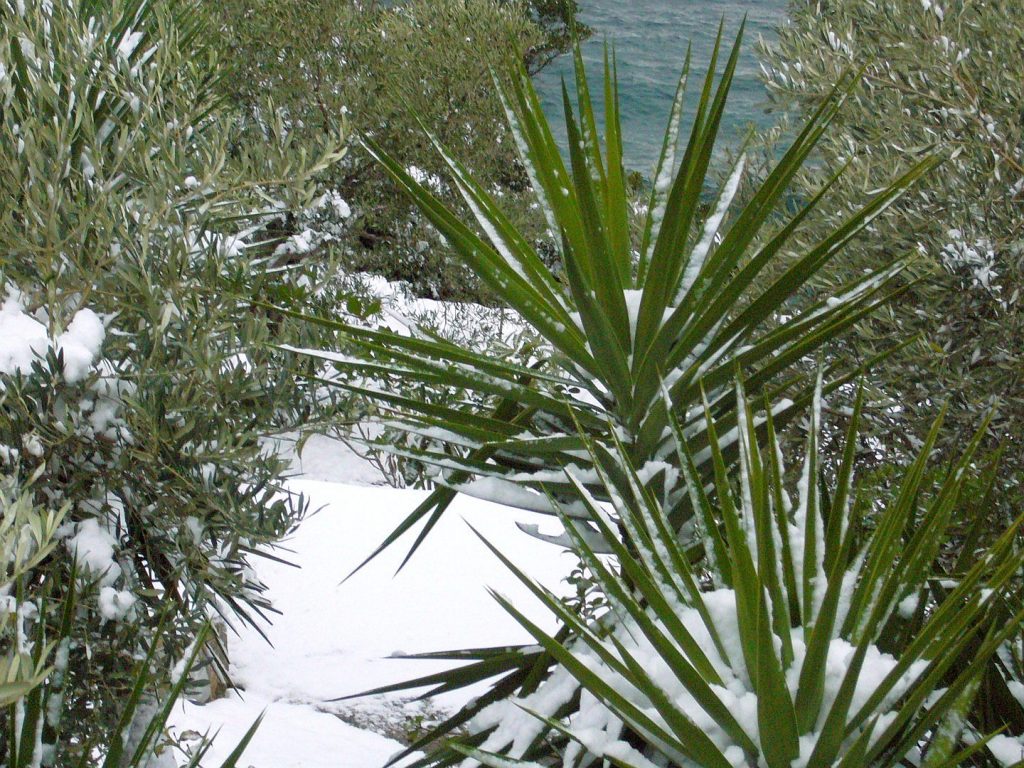
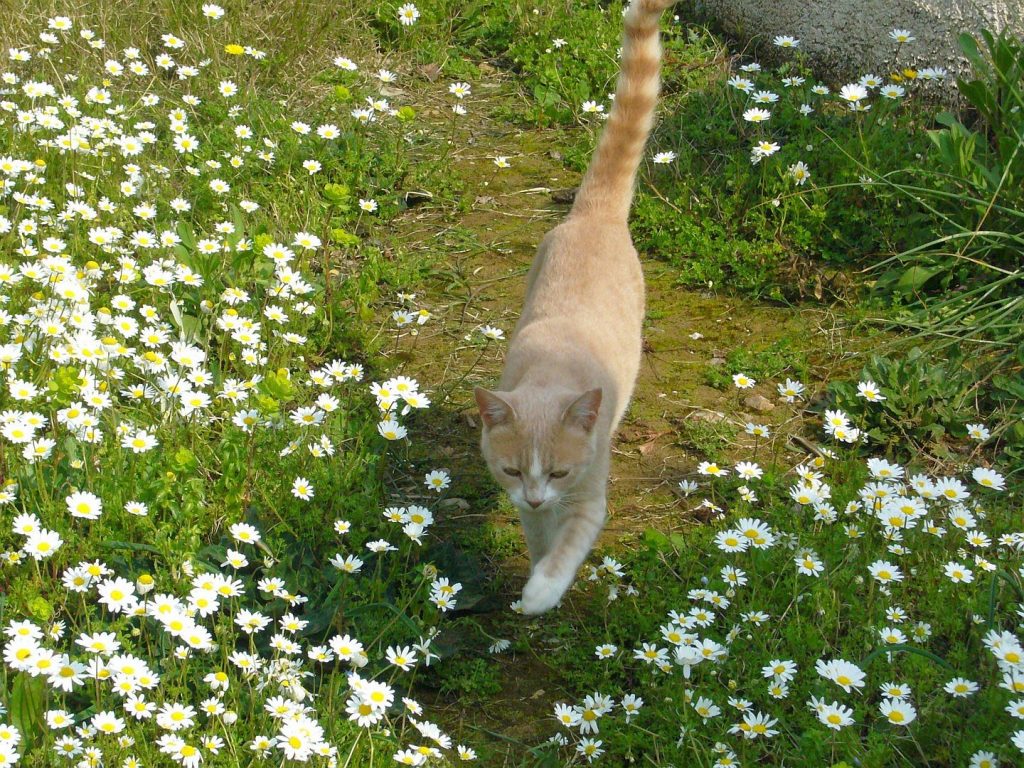
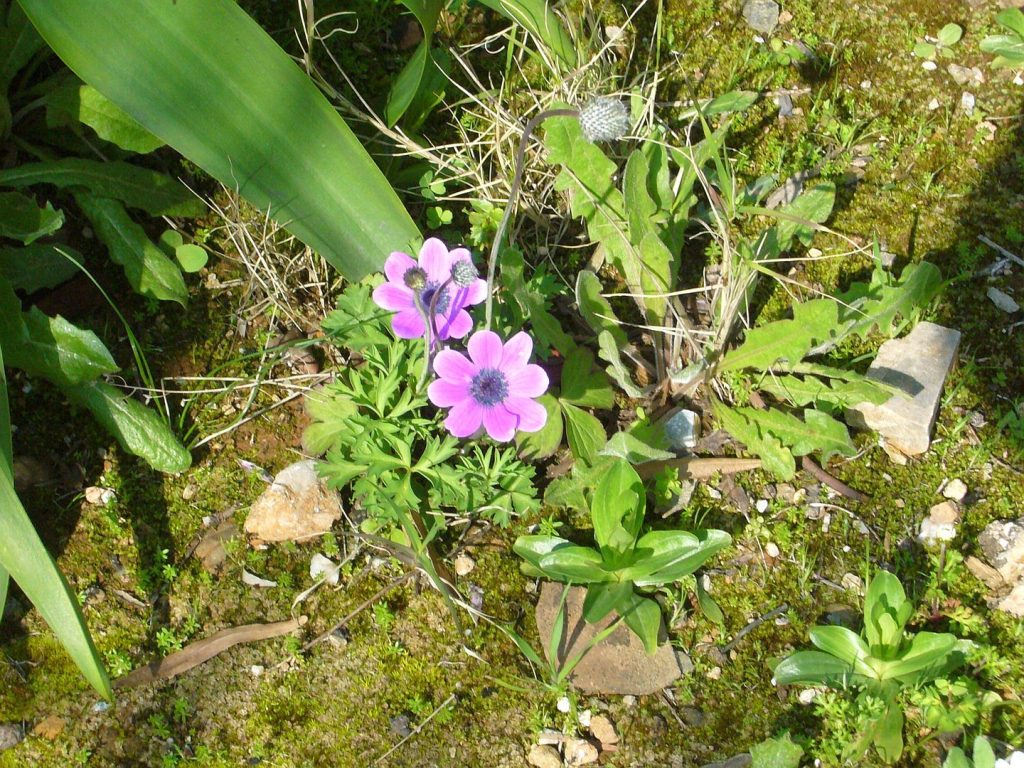
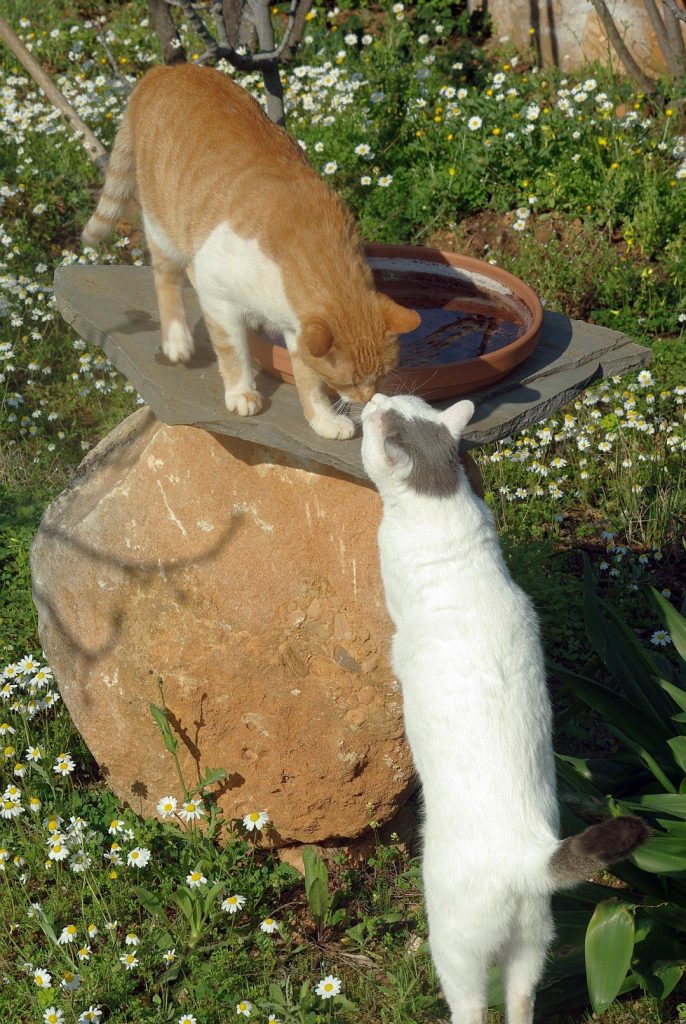
![P1300127 [HDTV (1080)]](http://chasingcentaurs.com/wp-content/uploads/2016/03/P1300127-HDTV-1080-1024x768.jpg)
![P1310027 [HDTV (1080)]](http://chasingcentaurs.com/wp-content/uploads/2016/03/P1310027-HDTV-1080-1024x768.jpg)
![P1310026 [HDTV (1080)]](http://chasingcentaurs.com/wp-content/uploads/2016/03/P1310026-HDTV-1080-1024x768.jpg)
![P1300663 [HDTV (1080)]](http://chasingcentaurs.com/wp-content/uploads/2016/03/P1300663-HDTV-1080-1024x768.jpg)
![P1310196 [HDTV (1080)]](http://chasingcentaurs.com/wp-content/uploads/2016/03/P1310196-HDTV-1080-1024x563.jpg)
![P1310204 [HDTV (1080)]](http://chasingcentaurs.com/wp-content/uploads/2016/03/P1310204-HDTV-1080-1024x661.jpg)
![P1310182 [HDTV (1080)]](http://chasingcentaurs.com/wp-content/uploads/2016/03/P1310182-HDTV-1080-1024x768.jpg)
![P1310194 [HDTV (1080)]](http://chasingcentaurs.com/wp-content/uploads/2016/03/P1310194-HDTV-1080-1024x768.jpg)
![P1300350 [HDTV (1080)]](http://chasingcentaurs.com/wp-content/uploads/2016/02/P1300350-HDTV-1080-1024x776.jpg)
![P1010041 [HDTV (720)]](http://chasingcentaurs.com/wp-content/uploads/2016/02/P1010041-HDTV-720.jpg)
![P1300283 [HDTV (1080)]](http://chasingcentaurs.com/wp-content/uploads/2016/02/P1300283-HDTV-1080-1024x688.jpg)
![P1300280 [HDTV (1080)]](http://chasingcentaurs.com/wp-content/uploads/2016/02/P1300280-HDTV-1080-1024x787.jpg)
![P1300232 [HDTV (1080)]](http://chasingcentaurs.com/wp-content/uploads/2016/02/P1300232-HDTV-1080-701x1024.jpg)
![P1300227 [HDTV (1080)]](http://chasingcentaurs.com/wp-content/uploads/2016/02/P1300227-HDTV-1080-1024x715.jpg)
![P1300224 [HDTV (1080)]](http://chasingcentaurs.com/wp-content/uploads/2016/02/P1300224-HDTV-1080-1024x618.jpg)
![P1300217 [HDTV (1080)]](http://chasingcentaurs.com/wp-content/uploads/2016/02/P1300217-HDTV-1080-1024x979.jpg)
![P1300207 [HDTV (1080)]](http://chasingcentaurs.com/wp-content/uploads/2016/02/P1300207-HDTV-1080-1024x621.jpg)
![P1300201 [HDTV (1080)]](http://chasingcentaurs.com/wp-content/uploads/2016/02/P1300201-HDTV-1080-1024x586.jpg)
![P1300198 [HDTV (1080)]](http://chasingcentaurs.com/wp-content/uploads/2016/02/P1300198-HDTV-1080-1024x674.jpg)
![P1300193 [HDTV (1080)]](http://chasingcentaurs.com/wp-content/uploads/2016/02/P1300193-HDTV-1080-926x1024.jpg)
![P1270728 [HDTV (1080)]](http://chasingcentaurs.com/wp-content/uploads/2016/02/P1270728-HDTV-1080-1024x799.jpg)
![P1270723 [HDTV (1080)]](http://chasingcentaurs.com/wp-content/uploads/2016/02/P1270723-HDTV-1080-815x1024.jpg)
![P1270701 [HDTV (1080)]](http://chasingcentaurs.com/wp-content/uploads/2016/02/P1270701-HDTV-1080-1024x711.jpg)
![P1270585 [HDTV (1080)]](http://chasingcentaurs.com/wp-content/uploads/2016/02/P1270585-HDTV-1080-1024x715.jpg)
![P1250814 [HDTV (1080)]](http://chasingcentaurs.com/wp-content/uploads/2016/02/P1250814-HDTV-1080-1024x959.jpg)
![P1250774 [HDTV (1080)]](http://chasingcentaurs.com/wp-content/uploads/2016/02/P1250774-HDTV-1080-1024x820.jpg)
![P1250705 [HDTV (1080)]](http://chasingcentaurs.com/wp-content/uploads/2016/02/P1250705-HDTV-1080-1024x859.jpg)
![P1240812 [HDTV (1080)]](http://chasingcentaurs.com/wp-content/uploads/2016/02/P1240812-HDTV-1080-1024x694.jpg)
![P1240766 [HDTV (1080)]](http://chasingcentaurs.com/wp-content/uploads/2016/02/P1240766-HDTV-1080-1024x619.jpg)
![P1070576 [HDTV (1080)]](http://chasingcentaurs.com/wp-content/uploads/2016/02/P1070576-HDTV-1080-1024x557.jpg)
![P1070573 [HDTV (1080)]](http://chasingcentaurs.com/wp-content/uploads/2016/02/P1070573-HDTV-1080-795x1024.jpg)
![P1300643 [HDTV (1080)]](http://chasingcentaurs.com/wp-content/uploads/2016/02/P1300643-HDTV-1080-1024x768.jpg)
![P1300326 [HDTV (1080)]](http://chasingcentaurs.com/wp-content/uploads/2016/02/P1300326-HDTV-1080-1024x697.jpg)
![P1300322 [HDTV (1080)]](http://chasingcentaurs.com/wp-content/uploads/2016/02/P1300322-HDTV-1080-1024x683.jpg)
![P1300335 [HDTV (1080)]](http://chasingcentaurs.com/wp-content/uploads/2016/02/P1300335-HDTV-1080-800x1024.jpg)
![P1300318 [HDTV (1080)]](http://chasingcentaurs.com/wp-content/uploads/2016/02/P1300318-HDTV-1080-1024x747.jpg)
![P1300311 [HDTV (1080)]](http://chasingcentaurs.com/wp-content/uploads/2016/02/P1300311-HDTV-1080-1024x661.jpg)
![P1300308 [HDTV (1080)]](http://chasingcentaurs.com/wp-content/uploads/2016/02/P1300308-HDTV-1080-1024x716.jpg)
![P1300304 [HDTV (1080)]](http://chasingcentaurs.com/wp-content/uploads/2016/02/P1300304-HDTV-1080-958x1024.jpg)
![P1300314 [HDTV (1080)]](http://chasingcentaurs.com/wp-content/uploads/2016/02/P1300314-HDTV-1080-1024x663.jpg)
![P1300298 [HDTV (1080)]](http://chasingcentaurs.com/wp-content/uploads/2016/02/P1300298-HDTV-1080-1024x998.jpg)
![P1300293 [HDTV (1080)]](http://chasingcentaurs.com/wp-content/uploads/2016/02/P1300293-HDTV-1080-1024x1017.jpg)
![P1300287 [HDTV (1080)]](http://chasingcentaurs.com/wp-content/uploads/2016/02/P1300287-HDTV-1080-1-1024x786.jpg)
![P1300246 [HDTV (1080)]](http://chasingcentaurs.com/wp-content/uploads/2016/01/P1300246-HDTV-1080-1024x694.jpg)
![P1300259 [HDTV (1080)]](http://chasingcentaurs.com/wp-content/uploads/2016/01/P1300259-HDTV-1080-1024x618.jpg)
![P1300275 [HDTV (1080)]](http://chasingcentaurs.com/wp-content/uploads/2016/01/P1300275-HDTV-1080-1024x629.jpg)
![P1300247 [HDTV (1080)]](http://chasingcentaurs.com/wp-content/uploads/2016/01/P1300247-HDTV-1080-1024x677.jpg)
![P1300249 [HDTV (1080)]](http://chasingcentaurs.com/wp-content/uploads/2016/01/P1300249-HDTV-1080-1024x623.jpg)
![P1300252 [HDTV (1080)]](http://chasingcentaurs.com/wp-content/uploads/2016/01/P1300252-HDTV-1080-1024x705.jpg)
![P1300265 [HDTV (1080)]](http://chasingcentaurs.com/wp-content/uploads/2016/01/P1300265-HDTV-1080-1024x611.jpg)
![P1300273 [HDTV (1080)]](http://chasingcentaurs.com/wp-content/uploads/2016/01/P1300273-HDTV-1080-1024x656.jpg)
![P1300263 [HDTV (1080)]](http://chasingcentaurs.com/wp-content/uploads/2016/01/P1300263-HDTV-1080-1024x687.jpg)
![P1300257 [HDTV (1080)]](http://chasingcentaurs.com/wp-content/uploads/2016/01/P1300257-HDTV-1080-1024x606.jpg)
![P1300266 [HDTV (1080)]](http://chasingcentaurs.com/wp-content/uploads/2016/01/P1300266-HDTV-1080-1024x606.jpg)
![P1300258 [HDTV (1080)]](http://chasingcentaurs.com/wp-content/uploads/2016/01/P1300258-HDTV-1080-1024x778.jpg)
![P1300274 [HDTV (1080)]](http://chasingcentaurs.com/wp-content/uploads/2016/01/P1300274-HDTV-1080-1024x708.jpg)
![P1300268 [HDTV (1080)]](http://chasingcentaurs.com/wp-content/uploads/2016/01/P1300268-HDTV-1080-1024x658.jpg)
![P1300271 [HDTV (1080)]](http://chasingcentaurs.com/wp-content/uploads/2016/01/P1300271-HDTV-1080-1024x609.jpg)
![P1290872 [HDTV (1080)]](http://chasingcentaurs.com/wp-content/uploads/2016/01/P1290872-HDTV-1080-1024x681.jpg)
![P1290845 [HDTV (1080)]](http://chasingcentaurs.com/wp-content/uploads/2016/01/P1290845-HDTV-1080-1024x790.jpg)
![P1290833 [HDTV (1080)]](http://chasingcentaurs.com/wp-content/uploads/2016/01/P1290833-HDTV-1080-1024x768.jpg)
![P1290836 [HDTV (1080)]](http://chasingcentaurs.com/wp-content/uploads/2016/01/P1290836-HDTV-1080-1024x768.jpg)
![P1290870 [HDTV (1080)]](http://chasingcentaurs.com/wp-content/uploads/2016/01/P1290870-HDTV-1080-1024x641.jpg)
![P1290835 [HDTV (1080)]](http://chasingcentaurs.com/wp-content/uploads/2016/01/P1290835-HDTV-1080-1024x768.jpg)
![P1290838 [HDTV (1080)]](http://chasingcentaurs.com/wp-content/uploads/2016/01/P1290838-HDTV-1080-1024x768.jpg)
![P1290846 [HDTV (1080)]](http://chasingcentaurs.com/wp-content/uploads/2016/01/P1290846-HDTV-1080-1024x632.jpg)
![P1290851 [HDTV (1080)]](http://chasingcentaurs.com/wp-content/uploads/2016/01/P1290851-HDTV-1080-1024x642.jpg)
![P1290856 [HDTV (1080)]](http://chasingcentaurs.com/wp-content/uploads/2016/01/P1290856-HDTV-1080-1024x768.jpg)
![P1290857 [HDTV (1080)]](http://chasingcentaurs.com/wp-content/uploads/2016/01/P1290857-HDTV-1080-1024x768.jpg)
![P1290859 [HDTV (1080)]](http://chasingcentaurs.com/wp-content/uploads/2016/01/P1290859-HDTV-1080-1024x678.jpg)
![P1290866 [HDTV (1080)]](http://chasingcentaurs.com/wp-content/uploads/2016/01/P1290866-HDTV-1080-1024x663.jpg)
![P1290867 [HDTV (1080)]](http://chasingcentaurs.com/wp-content/uploads/2016/01/P1290867-HDTV-1080-1024x648.jpg)
![P1290868 [HDTV (1080)]](http://chasingcentaurs.com/wp-content/uploads/2016/01/P1290868-HDTV-1080-1024x806.jpg)
![P1290869 [HDTV (1080)]](http://chasingcentaurs.com/wp-content/uploads/2016/01/P1290869-HDTV-1080-1024x703.jpg)
![P1290863 [HDTV (1080)]](http://chasingcentaurs.com/wp-content/uploads/2016/01/P1290863-HDTV-1080-1024x708.jpg)
![P1290840 [HDTV (1080)]](http://chasingcentaurs.com/wp-content/uploads/2016/01/P1290840-HDTV-1080-1024x768.jpg)
![P1290842 [HDTV (1080)]](http://chasingcentaurs.com/wp-content/uploads/2016/01/P1290842-HDTV-1080-1024x768.jpg)
![P1290844 [HDTV (1080)]](http://chasingcentaurs.com/wp-content/uploads/2016/01/P1290844-HDTV-1080-1024x768.jpg)
![P1290861 [HDTV (1080)]](http://chasingcentaurs.com/wp-content/uploads/2016/01/P1290861-HDTV-1080-1024x765.jpg)
![P1290855 [HDTV (1080)]](http://chasingcentaurs.com/wp-content/uploads/2016/01/P1290855-HDTV-1080-1024x713.jpg)
![P1280873 [HDTV (1080)]](http://chasingcentaurs.com/wp-content/uploads/2015/12/P1280873-HDTV-1080-1024x768.jpg)
![P1280613 [HDTV (1080)]](http://chasingcentaurs.com/wp-content/uploads/2015/12/P1280613-HDTV-1080-1024x615.jpg)
![P1280584 [HDTV (1080)]](http://chasingcentaurs.com/wp-content/uploads/2015/12/P1280584-HDTV-1080-1024x533.jpg)
![P1280592 [HDTV (1080)]](http://chasingcentaurs.com/wp-content/uploads/2015/12/P1280592-HDTV-1080-1024x768.jpg)
![P1280603 [HDTV (1080)]](http://chasingcentaurs.com/wp-content/uploads/2015/12/P1280603-HDTV-1080-1024x653.jpg)
![P1280609 [HDTV (1080)]](http://chasingcentaurs.com/wp-content/uploads/2015/12/P1280609-HDTV-1080-1024x640.jpg)
![P1280675 [HDTV (1080)]](http://chasingcentaurs.com/wp-content/uploads/2015/12/P1280675-HDTV-1080-1024x678.jpg)
![P1280707 [HDTV (1080)]](http://chasingcentaurs.com/wp-content/uploads/2015/12/P1280707-HDTV-1080-1024x669.jpg)
![P1280708 [HDTV (1080)]](http://chasingcentaurs.com/wp-content/uploads/2015/12/P1280708-HDTV-1080-768x1024.jpg)
![P1280709 [HDTV (1080)]](http://chasingcentaurs.com/wp-content/uploads/2015/12/P1280709-HDTV-1080-1024x668.jpg)
![P1280713 [HDTV (1080)]](http://chasingcentaurs.com/wp-content/uploads/2015/12/P1280713-HDTV-1080-768x1024.jpg)
![P1280716 [HDTV (1080)]](http://chasingcentaurs.com/wp-content/uploads/2015/12/P1280716-HDTV-1080-768x1024.jpg)
![P1280717 [HDTV (1080)]](http://chasingcentaurs.com/wp-content/uploads/2015/12/P1280717-HDTV-1080-768x1024.jpg)
![P1280720 [HDTV (1080)]](http://chasingcentaurs.com/wp-content/uploads/2015/12/P1280720-HDTV-1080-866x1024.jpg)
![P1280724 [HDTV (1080)]](http://chasingcentaurs.com/wp-content/uploads/2015/12/P1280724-HDTV-1080-768x1024.jpg)
![P1280725 [HDTV (1080)]_ShiftN](http://chasingcentaurs.com/wp-content/uploads/2015/12/P1280725-HDTV-1080_ShiftN-1024x814.jpg)
![P1280728 [HDTV (1080)]](http://chasingcentaurs.com/wp-content/uploads/2015/12/P1280728-HDTV-1080-768x1024.jpg)
![P1280729 [HDTV (1080)]](http://chasingcentaurs.com/wp-content/uploads/2015/12/P1280729-HDTV-1080-768x1024.jpg)
![P1280730 [HDTV (1080)]](http://chasingcentaurs.com/wp-content/uploads/2015/12/P1280730-HDTV-1080-768x1024.jpg)
![P1280731 [HDTV (1080)]](http://chasingcentaurs.com/wp-content/uploads/2015/12/P1280731-HDTV-1080-768x1024.jpg)
![P1280735 [HDTV (1080)]](http://chasingcentaurs.com/wp-content/uploads/2015/12/P1280735-HDTV-1080-768x1024.jpg)
![P1280736 [HDTV (1080)]](http://chasingcentaurs.com/wp-content/uploads/2015/12/P1280736-HDTV-1080-768x1024.jpg)
![P1280743 [HDTV (1080)]](http://chasingcentaurs.com/wp-content/uploads/2015/12/P1280743-HDTV-1080-1024x768.jpg)
![P1280750 [HDTV (1080)]](http://chasingcentaurs.com/wp-content/uploads/2015/12/P1280750-HDTV-1080-833x1024.jpg)
![P1280783 [HDTV (1080)]_ShiftN](http://chasingcentaurs.com/wp-content/uploads/2015/12/P1280783-HDTV-1080_ShiftN-743x1024.jpg)
![P1280841 [HDTV (1080)]](http://chasingcentaurs.com/wp-content/uploads/2015/12/P1280841-HDTV-1080-768x1024.jpg)